#and Devin Grayson generally.
Text
I’m just gonna come right out and say it…
Dick Grayson, on a character level, did not need a “fix-it” for the original Nightwing #93 arc—ESPECIALLY not one that was just a shallow retread but now with extra 0 emotional stakes, 0 build up, and a pastede on yay happy ending.
#dick grayson#nightwing#cw: rape#discussion further below#this may be controversial.#i know a lot of people dislike that arc and how far it went.#and also Devin Grayson’s comments on it.#(which is fair.)#and Devin Grayson generally.#HOWEVER.#as a completely objective third party observer with no personal interest in the matter…#(meaning *disclaimer disclaimer this is my own personal opinion disclaimer disclaimer*)#i think this was HUGE for Dick Grayson as a character and Nightwing as a hero.#and a real fix-it would be the narrative FULLY ACKNOWLEDGING that Dick Grayson was raped.#and to stop having dude writers sweep it under the rug because ‘things like that don’t happen to Dick Grayson.’#because I think that’s where a lot of the in-company and dude fans’ antipathy comes from—#…the very concept that Dick Grayson could be a victim in that way…#is abhorrent to them on a level that they don’t usually experience.#and so they try to write over it awkwardly by treating it like it was consensual.#which…I shouldn’t have to explain why that’s a terrible way to handle it.#or—in this case—it is just written over entirely and replace with the equivalent of those ‘and then everybody clapped!’ stories.#but I think that’s a disservice to Dick Grayson as a character and to comics as a storytelling medium.#not to mention that…#if you divorce the current issue from the original number 93 arc…#IT’S A REALLY FUCKING POINTLESS STORY.#dick Grayson’s identity is revealed! oh wait it’s fine blockbuster dies and he and Barbara kiss.#okay????#what was the purpose of that?!#SIGH.#comics are bad and i hate them
26 notes
·
View notes
Text
Gotham Knights 16&17: *stares into the camera* I am WAY too white (I’m not even Pākehā!) for this but also I know enough to say this outright. That’s some racist shit right there.
Anyway society be normal about tā moko in Māori and Pasifika communities and about not using it to depict villainhood.
(Seriously, I’m Australian, I can use all of about a dozen words of te reo appropriately in context and read/understand maybe a few dozen more? But I can hack BASIC PASIFIKA POLITENESS)
#z canon read throughs#the things Devin Grayson has done to characters#my te reo use is at the very general level of ‘I have Kiwi friends and so am used to the modern background level’#at least half my vocab is just bird names#just out here trying to make sure I use macrons appropriately
10 notes
·
View notes
Text
damn okay I didn’t expect so much anti Rromani bigotry in this comic, I didn’t realize Tora was even Rromani until this 😭
#like um… ‘our people steal that’s what we do’ it’s like reading Devin Grayson comics all over again 🙄#currently consuming#heroesriseandfall#justice league: generation lost#anti rromani bigotry#tora olafsdotter#get some rromani writers or advisers or something idk just chill about the stealing thing#judd winick
4 notes
·
View notes
Note
CACKLING. The whole “spoilers are the least of your worries, NW solo runs are actual ass” thing is so true. My boy cannot catch a break.
Bruno Redondo, I love your art, but I canNOT for the life of me get into Devin Grayson’s Nightwing.
That last anon made me curious, do you have any favorite eras/stories with Nightwing in it? Obviously doesn’t have to be a NW solo run. I was thinking within the DC continuity in general (if that makes sense).
if we’re asking just generally, most of the comics that I prefer are where nightwing are more decentered and often the support/mentor of the story. Like when he becomes Batman in Batman and Robin or he comes back to gotham to bond with new robins. These are all one shots that fall into dixon’s nightwing, I think. Probably, idk. There’s that specific art style of the era where he looked kinda ugly.
Most of my favorites are early nightwing/disco wing. My reading preferences tend to be on the goofy comics side.
Off the top of my head, I was recommended Batman prodigal by an anon here. I liked the dynamic between Tim and Dick and it was a good entry for someone who didn’t really know Tim that well before this. When they did laundry together, it was really nice. I like that mundane closed off world stuff. I do like it more than Grant Morrison’s Batman and Robin (I know. Tomato, tomato, tomato. Damian traitor🍅🍅🍅).
I think my other favorite ones are the two stories of Dick riding on top of trains. Dick not only rode on top of trains once, but twice. Each time with a different robin. It should be under Nightwing but I don’t remember the numbers of the issue.
Here’s Jason:
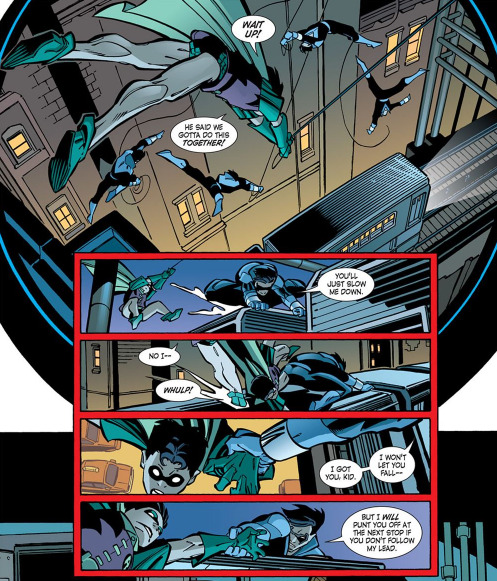
And here’s Tim:
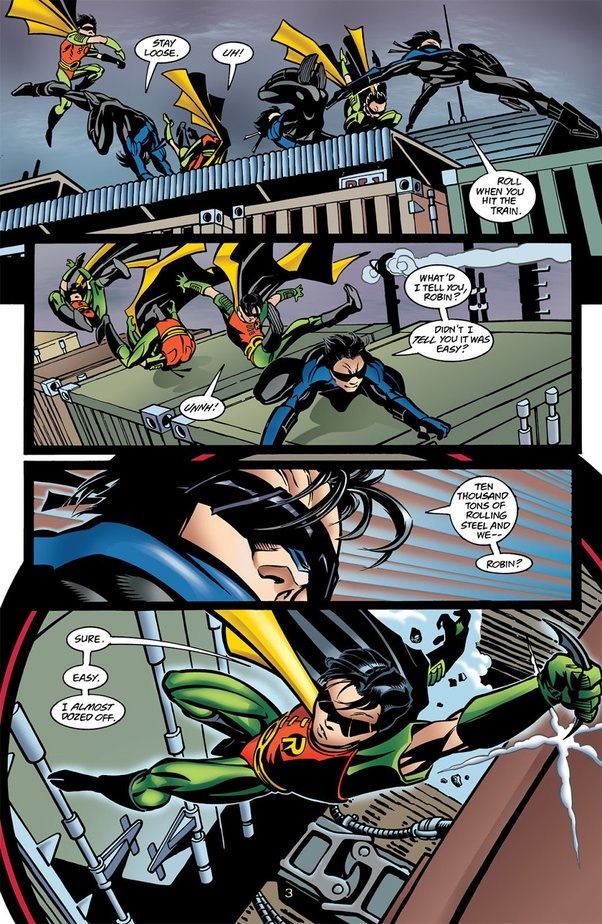
At least Jason wasn’t blindfolded. Tim was just like yeah, whatever.
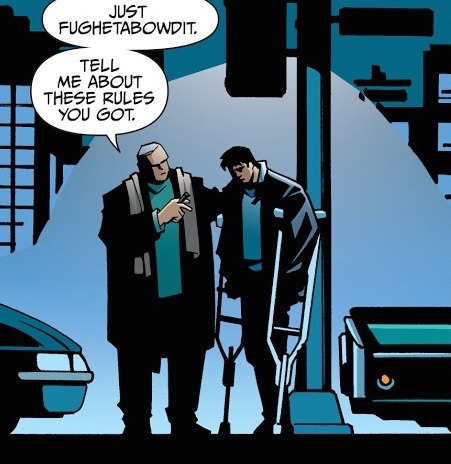
I did like the era of shot in the leg dick (Nightwing vol 2, ~108) because he found a family outside of the bats and dealing with not being nightwing anymore. Then the story fell off…. many such cases. I’m not a big romance reader despite (waves) everything. Especially if they choose to throw brainless love interests at nightwing for plot. I’ve become some kind of single life activist for him. I don’t want romance!
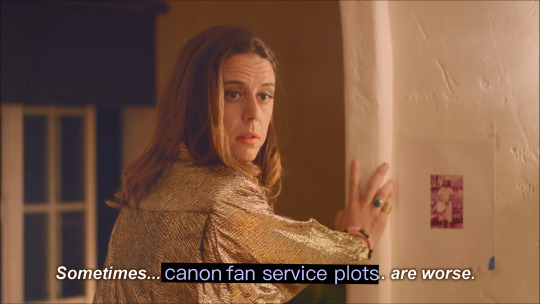
94 notes
·
View notes
Text
and actually, while there are certainly a lot. Lot. of criticisms to made re: dixon & his writing of steph and the sexism therein (although, it's very prevalent and like 'yea that's bad' but also sometimes it's like. well, it's not actually necessarily significantly more or out of the ordinary than most other 80s & 90s media in comparison) (listen i grew up taking out jem and the holograms vhs's from blockbuster every week, there is actually no amount of bullshit that can ever top the jerrica/rio/jem bullshit for me, i am highly desensitized here (two of those people are the same person. one is a man who, for unexplained reasons, really, really, really hates liars in any way, shape, or form)), i do feel that because he's such a reprehensible person there's a lot of. hm. malice retroactively attributed to him re: his writing of steph on account of the way that she was treated after he stopped writing her that is not actually there in the text & in fact is completely at odds with his long-term plans & ideas & hopes for her story & the fact that he was very vocally unhappy with the direction editorial took with her after he was removed.
like he did not write her as messing up & being reckless & being as less skilled because he didn't like her or he wanted readers to dislike her or anything. (i'd argue it's the opposite, actually). her story through his writing is one where she would have eventually received the full acceptance she deserved, which is why he eventually wanted to culminate her success into temporarily becoming robin, the ultimate reward, & in fact his plans for that story is that she would be so super amazing at it because of her determination and hard work and the only reason it wouldn't have worked out long term is because bruce would want to protect her. it's why towards the end of his run writing her she finally was receiving the full acceptance he felt she deserved from both batman & the birds of prey, she was finally in the know as far as tim's secret & getting more integrated into the batfam as a whole, & she was finally gaining tentative acceptance and mentorship from dinah which would put her on more equal footing with cass & tim. a classic rags to riches story.
it was murderer/fugitive and the removal of his influence for her character where things actually start to go south for her, under editorial directive. if you're thinking her finally being completely kicked out over one minor mistake vs just chided but in general allowed to continue regardless, you're thinking devin grayson in gotham knights. if you want to talk about a batman who thinks that steph is a weak link who's going to get hurt with her recklessness (and that gets reinforcedby the narrative by her continuing to act reckless, and lying to tim about a lot of things) you're thinking lewis. if you're thing just making her abjectly terrible at things for the explicit purpose of justifying her being not good enough and undeserving at doing this, you're talking about willingham & dc editorial deciding to axe her character. in comparison, if you look at her being dropped by the birds of prey, written by dixon, you get dinah giving her a talk about how talented steph is, it's just that dinah is not her mentor & can't give her the attention she needs (probably the absolute kindest rejection she gets in that era where dixon is being transitioned out and i think it's notable that he wrote such a kind rejection in comparison to everyone else's at the time).
58 notes
·
View notes
Text
Pr*shippers really be like 'Purity Culture is so funny,like just look at all these medias with canon problematic ships!!!' and then the examples they use are like.Lolita(Humbert is an unreliable narrator who's so self-obsessed he victim blames his own stepdaughter who's life he ruined because she was 'irresisteble' and Dolores is played as an extremely tragic victim).Flowers in the Attic(a horror story where the Dollanganger family's incest is potrayed as what traumatized all of them and unwanted).Labyrinth(Jareth is the villain and Sarah never shows any signs of liking him back).Hades and Persephone(the beginner myth was Hymn to Demeter,which is about how women in ancient greece had no power to protect their daughters from older men and how it's bad and Persephone is miserable the whole time,including struggling against Hades' kidnapping and descriptions of her being a little girl).Batman and Robin(there is no evidence from og comics writers that they intended it the dynamic/archetype/trope as a pedestary metaphor and fan spectulation dosen't count because they're not the ones actually writing comics and Devin Grayson has apologized for her misenterpretations and said she wished she'd never written them and that it was fucked up on her part to).Game of Thrones is a popular one too but George R.R Martin is a raging racist and misogynist who employs propaganda and caricatures all over his books and with other badly written and especially positively potrayed examples,this is almost always the same case!!!!Historically and to this day the elements in 'dark romance' are used as punishments for poc and women and woc most of all,including trans ones and just trans people in general and disabled people and every minority fullstop!!!They are objectively not morally neutral and you have to be a really cruel and self-righteous perdon to ignore that!Fandom history dosen't erase real history.Fiction is not reality but pr*shippers care more about fictional people than real people and that's why they're bad.You're the bad guys in stories too for a reason and your lack of media comprehension is not the fault of your sociatel structurer 'lessers'
#antiproship#child abuse cw#pedophillia tw#child molestation cw#grooming cw#incest cw#misogyny cw#racism cw#kink critical#on the far right side of history#lolita#vladimir nabokov#flowers in the attic#labyrinth#labyrinth 1986#greek mythos#batfam#anti got#dolores haze#cathy dollanganger#chris dollanganger#sarah williams#persephone tag#demeter#bruce wayne#dick grayson#jason todd#summerposting
33 notes
·
View notes
Note
Made a post about my 3 things I want to see with every Wonder Woman adaptation, despite needing to do some catching up myself. Related, do you have a link to a Wonder Woman reading list?
https://at.tumblr.com/paigeoforacle/1-keep-fights-to-a-minimum/k7nbubhe1qws
Nice list!
As for my Wonder Woman recs list....technically, yes. I made a Wonder Woman starter recs list way back in 2017 right after the movie came out. However, it's outdated, I've changed my opinion on some of the things I said there as I've read more Wonder Woman comics, and it also fails to include several good comics. So here's my current Wonder Woman recs list:
Starter comics: These are great comics to read if you're new to Wonder Woman comics or only have a passing familiarity with her:
Wonder Woman: Year One, by Greg Rucka
Wonder Woman (1987) #1-62, by George Perez
Wonder Woman: The Hiketeia, by Greg Rucka
JLA: League of One, by Christopher Moeller
The Legend of Wonder Woman, by Ray Dillion and Renee De Liz
Wonder Woman: Historia, by Kelly Sue DeConnick
Wonder Woman (1987) #170, by Phil Jimenez (the Diana-Lois 'Day in the Life' issue)
"Generations" from Sensation Comics Featuring Wonder Woman, by Michael Jelenic (Issue #12 digitally, Issue #7 print)
Wonder Woman: Our Worlds At War, by Phil Jimenez (warning: this oneshot ties into the "Our Wolds at War" event, so the frame story will probably be confusing, but the majority of the story is a solid retelling of the collective Amazonian history up to that point)
Second-level comics: read these once you have a baseline familarity with Diana and her supporting cast:
Wonder Woman by Phil Jimenez, including Paradise Lost/Paradise Found (which I don't think are in the current Jimenez omnibus)
Wonder Woman by Greg Rucka (his first run on the title), with a particular call-out for the Medusa arc
Wonder Woman: The Circle and Ends of the Earth, by Gail Simone
Wonder Woman Rebirth (2016), by Greg Rucka (Rucka's second run; everything except Year One fits here)
Wonder Woman: The Twelve Labors (WW 1942 #212-222), by Len Wein and assorted other writers
Wonder Woman/Justice League Dark: The Witching Hour, by James Tynion IV
Wonder Woman: Lords and Liars by Mariko Tamaki
All of the comics on both lists are great; I have no hesitation recommending any of them. However, I will give a blanket warning for sexual assault in the Amazons' backstory, particularly during the seminal Perez run (which is very dated in how it handles the topic, unfortunately), and put a general note that while I can't think of anything outright offensive, various social issues are not always handled with grace (especially in the older runs).
Comics featuring the Wonderfam supporting cast:
New Teen Titans: Who is Donna Troy?, by Marv Wolfman*
Titans (1999), by Devin Grayson (for Donna)*
The Return of Donna Troy, by Phil Jimenez (collected in The Death and Return of Donna Troy)*
Wonder Woman: Lifelines (WW 1987 #105-108) and WW #109-113, by John Byrne (Cassie Sandsmark's introduction)
Young Justice (1998), by Peter David (for Cassie)*
Nubia and the Amazons, by Stephanie Williams and Vita Ayala*
Nubia: Queen of the Amazons, by Stephanie Williams and Vita Ayala*
Wonder Woman: The Contest (WW 1987 #0 and #90-100), by William Messner-Loebs (for Artemis of Bana-Mighdall)
Artemis: Requiem, by William Messner-Loebs (Note: this is not actually recommended reading. It's utterly cursed and I wouldn't put it on here if it wasn't absolutely necessary to understand how Artemis isn't dead after "The Contest." Read everything else on this list before you read this mini)
Wonder Woman: Gods of Gotham (WW 1987 #164-167), by Phil Jimenez*
Red Hood and the Outlaws Rebirth (2016) #1-24, by Scott Lobdell (for post-Flashpoint!Artemis, who's basically a different character)
Future State: Wonder Woman, by Joelle Jones (Yara Flor)
Wonder Girl (2021), by Joelle Jones (for Yara) (Note: this run is "just okay" and I'm reccing it with several reservations. However, it's also Yara's most prominent comic to date)
I've starred the ones on this list that I actually recommend as "good comics to read" and not just "decent starter comics for the character." Warning for depictions of sexual assault, bad art if you're looking at a pre-2000s comic, and being forced to engage with Scott Lobdell and William Messner-Loebs' writing.
I also recommend DC Bombshells by Marguerite Bennett; it's an Elseworlds comic set in WWII that co-stars Diana and it's delightful. There's certainly others that are decent, but I think this is a solid starter list if you want to understand Wonder Woman and how she should be written.
#wonder woman#wonderfam#comic masterposts#bri's recs#asks#diana of themiscyra#donna troy#cassie sandsmark#artemis of bana mighdall#yara flor#long post
244 notes
·
View notes
Text
A (Negative) Review of Tom Taylor's Nightwing Run - What Went Wrong? Villains
Introduction
Who is Dick Grayson?
What Went Wrong? Dick's Characterization
What Went Wrong? Barbara Gordon
What Went Wrong? Bludhaven (Part 1, Part 2)
What Went Wrong? Melinda Lin Grayson
What Went Wrong? Bea Bennett
What Went Wrong? Villains
Conclusion
Bibliography
During a discussion, Dick Grayson Fan C explained the importance of a balanced hero and villain dynamic by describing their relationship as inherently “symbiotic.” The two, after all, are interlinked, and the success and failures of one affects the way the audience perceives the other. When the audience knows that the hero will win the final confrontation, the questions surrounding how they will do so and what price they’ll pay to achieve said victory is what creates tension. In other words, the way in which a struggle unfolds is just as, if not sometimes more, important than its outcome.
Note that this symbiotic antagonistic dynamic is not limited to physical confrontations. A good hero-and-villain relationship is also an exploration of the protagonist’s psychology, their motivations, and the thematic questions of a story. A well-crafted villain should not only be providing a challenge to the hero in the battlefield, but also call into question the truths — or lies — that the hero believes in.
Taylor’s antagonists fail to provide Dick with any such challenges. And, as such, they fail to provide Dick with the opportunity to truly demonstrate who he is and what values Nightwing embodies
To prove my point, I wish to compare Taylor’s handling of Blockbuster with that of Chuck Dixon and Devin Grayson. While I considered also analyzing Heartless in detail as well, because the main Heartless confrontation is currently unfolding as time of writing, and because my main gripes with how Heartless was handled during the beginning of the run have already been addressed in other parts of this essay, I opted instead to keep my mentions of him brief. Furthermore, not only does Taylor’s parroting of Dixon’s and Grayson’s runs makes the comparisons between their Blockbusters unavoidable, but his take on Roland Desmond perfectly demonstrates how his simplistic morality contradicts the nuanced themes of social justice that seem to interest him.
(Similar to an earlier disclaimer I made on Dixon, I want to make it clear that just because I am comparing Grayson’s run favorably to Taylor’s, it does not mean that I am unaware of the issues present in her own story, nor that I disagree with much of the criticism directed at it. Despite enjoying much of what she wrote, I also readily concur that there are problematic elements to it, and I often found myself questioning her intentions as I was unable to discern them. But that is something that would deserve its own essay and I do not want to further derail this one by discussing the extensive controversies about Grayson’s run and the way it is often regarded by Dick Grayson fans. Regardless of one's opinion of Grayson’s statements, I believe it is unquestionable that she handled Blockbuster’s ruthlessness and the way he personally terrorized Dick through a form of targeted persecution that was mentally and emotionally torturous was leagues above the generic intimidation tactics employed by Taylor’s Blockbuster.)
When I claim that Taylor’s characterization of Blockbuster reveals his simplistic morality, I do not mean to imply that I wish for Blockbuster (or even Heartless, for that matter) to be sympathetic. I do not believe that they must have redeemable qualities that endear them to the reader in order for them to be interesting. While I enjoy the tragic villain trope, I’m also a big fan of the terrible villain who gets under your skin and inspires such hatred that you cannot wait to see them defeated. I believe that just as a person can enjoy both comedies and dramas without thinking one genre is superior to the other, we can also have all sorts of villains and enjoy them on their own terms.
That being said, I do expect villains to be interesting. I expect them to be meaningfully contributing to the story not only in terms of narrative conflict, but in challenging the protagonist, in creating stakes, and in being in conversation with the themes explored in a story, whatever those themes may be.
So know that when I am criticizing Taylor’s villains, I’m not doing so because I wish they were completely different characters from whom they were intended to be. When I critique their simplistic morality, I do so because Taylor invited such criticism when he coated his run in the veneer of social and political justice commentary by alluding to real world problems and trying to show how Dick Grayson would resolve them.
Let’s start by defining who Roland Desmond is, what conflicts his presence generates, and what he is meant to stand for in the narrative.
When examining Redondo’s design for this character, their intentions come through almost immediately: Blockbuster is meant to be threatening, corrupt, and ruthless. He is meant to be the type of oppressor who enriches himself at the expense of others. He yields his power to remain on top of the food chain, shamelessly bribing politicians and threatening his enemies. He will stop at nothing to retain control, he will not hesitate to destroy those who so much as dare to think about standing in his way. He has no sympathy for others, he does not care about their suffering, and he will gladly sacrifice their lives and the lives of their loved ones to get what he wants. All of these characteristics are physically manifested in his design, in which his oppressive frame demonstrates how he overpowers others and his giant hands are shown to be the type that could crush one’s bones just as his shadowy reign over Bludhaven crushes the city’s soul.
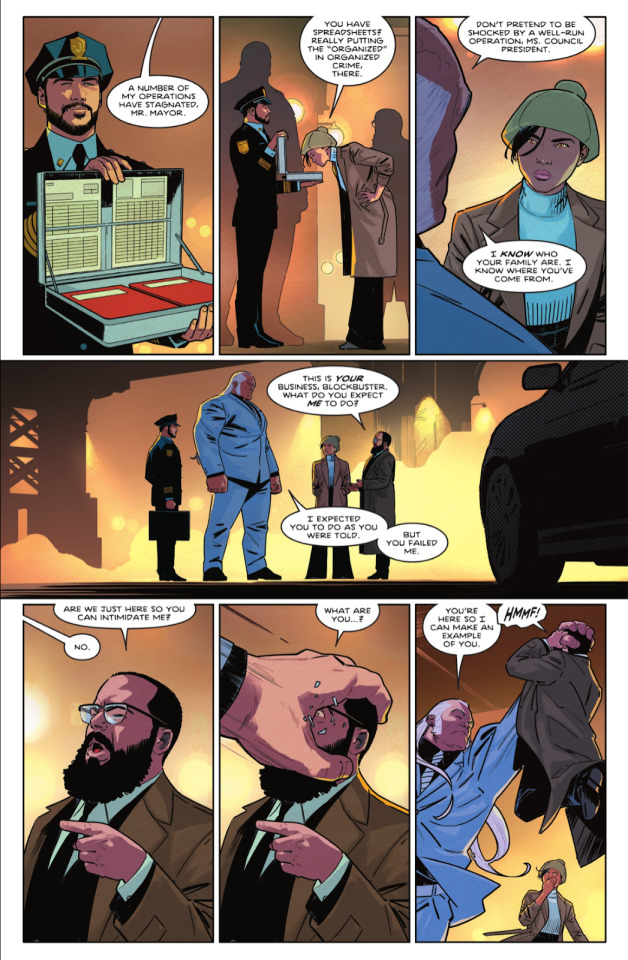
(Taylor, Tom, writer. Redondo, Bruno, illustrator. Leaping into the Light Part Two. Nightwing: Rebirth. 79, e-book ed. DC Comics, 2021. pp 14)
We can see this also through the dialogue of the story. For example, in #81, Melinda gets sworn in as mayor and Blockbuster’s men, in order to demonstrate the power they have over the politicians in the city, give her a suitcase full of money as a representation of the bribes that will be coming Melinda’s way.
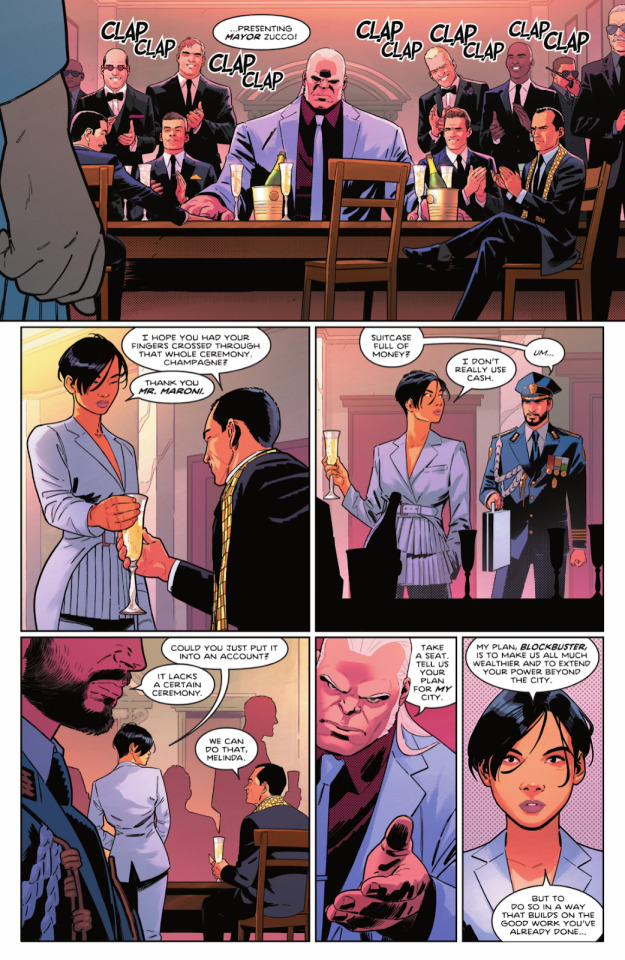
(Taylor, Tom, writer. Bruno, illustrator. Leaping into the Light Part 4. Nightwing: Rebirth. 81, e-book ed. DC Comics, 2021. pp 04)
Melinda, in order to continue her work undercover, plays into that by stating in a line that is as devoid of personality as it is of subtlety that, as mayor, she will make them all wealthier.
Similarly, in #83, Blockbuster states (also with little personality and little subtlety) that he owns the courts, that he sees himself as entitled to Bludhaven, and that because of the power he yields, he sees himself as invincible.
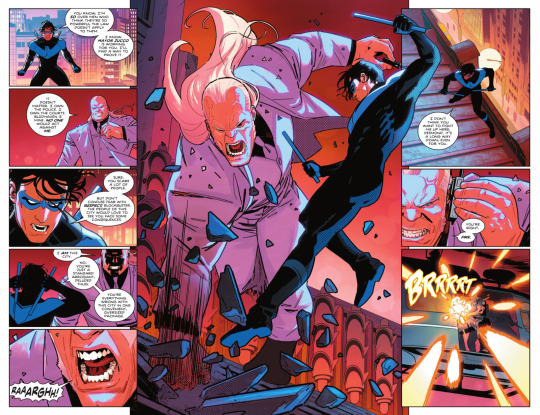
(Taylor, Tom, writer. Redondo, Bruno, illustrator. Leaping into the Light Part Six. Nightwing: Rebirth. 83, e-book ed. DC Comics, 2021. pp. 08)
Nightwing reaffirms this idea in that same issue when he says (also devoid of personality, subtlety, and this time charm or wit) that Blockbuster is “everything wrong with this city in one convenient, oversized package.”
This is what the conflict between Blockbuster and Nightwing is meant to symbolize — a struggle for the city’s future. Will Bludhaven continue to crumble under Blockbuster’s rule, or will Nightwing free it from his corrupt grip so that its citizens can finally have a chance to thrive? Even in the 1996 series, during both Dixon’s and Grayson’s runs, Blockbuster did not pose a threat to Dick’s morals or his world view. He did not make Dick question the way he saw people. Blockbuster’s targeting of Dick Grayson and his loved ones demonstrates how those with privilege go after the people who are fighting for change. Dick’s exhaustion and hopelessness mimics the same sense of helplessness one feels when it seems like the entire world is against you and the consequences for doing what is right can seem too great of a price to pay.
For this reason, Blockbuster does not need to be complex. He does not need to be sympathetic. But he does need to be powerful, threatening, and ruthless. He must push Dick to the edge, to make it seem like all it is lost, and in turn, when Dick finally pushes through and wins, it is a victory on both a personal and a societal level.
And this is where Taylor fails miserably.
Now, I have stated previously how, despite Taylor’s attempts, his rendition of Blockbuster comes off as flatly incompetent rather than threatening. I have discussed this under the context of how it influences the way Dick’s and Bludhaven’s portrayal. Now, I wish to dig deeper into this issue.
We are told of countless attempts on Dick’s life, but the only ones shown are overcome by Dick and his allies with ease. Either that, or the tension is undermined by a one-line joke or a general tone of casualness that fails to properly convey the stakes of the moment. Any threat that could have been created with Haley’s kidnapping or any intimidation tactic is destroyed by the gimmicky nature of the issue. This makes Blockbuster less of a threat.
And yet, we are told by Wally that Dick is stressed and overworked. But because there is not a lot of tension on screen, that telling rings hollow. The reader is not shown that Dick is overworked, and he is not shown truly struggling alone against the obstacles he does face, so this idea of Dick coming apart at the seams because of Blockbuster is not something the reader gets to truly experience. As a result, it often appears that Dick is coddled by his loved ones as everything always ends up alright with little effort made on their part. Rather than witnessing true danger take a toll on Dick, we are simply told this is something that is happening.
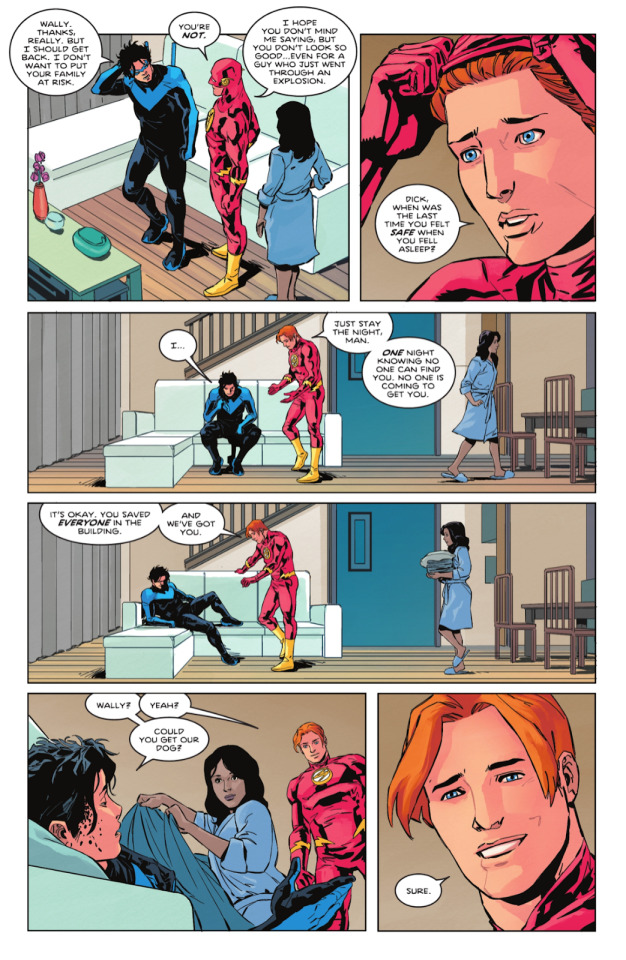
(Taylor, Tom, writer. Redondo, Bruno, illustrator. Get Grayson Act Three. Nightwing: Rebirth. 90, e-book ed. DC Comics, 2022. pp 16)
By comparison, when Grayson first wrote this same story nearly twenty years ago, she made it carry weight. She made it have consequences. While Dick was already coming apart from a myriad of different stress factors that unfolded on screen (overworking himself as Nightwing, as a police officer, saving Amy from Deathstroke, being fired from his job, Babs breaking up with him, and finally the circus fire), it was the explosion that made Dick fall apart, serving as the catalyst for his downward spiral. As Dick hunts down those Blockbuster employed, the readers get to see Dick’s exhaustion, Dick pushing himself to his limits, sleeping on fire-escapes while wearing his Nightwing uniform because he cannot bring himself to stop.
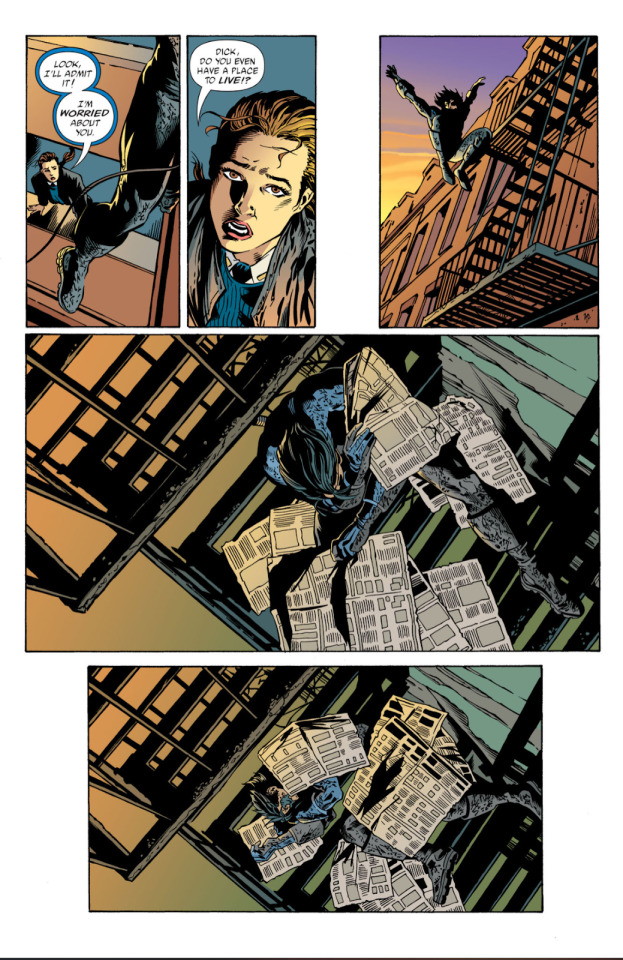
(Grayson, Devin, writer. Zircher, Patch, illustrator. Rekindle. Nightwing no 91, e-book ed. DC Comics, 2004. pp. 15)
Similarly, when the Judge returned to Bludhaven in The Untouchable, we see Dick keeping count of the bodies he left behind, we see Dick push through a bullet wound and beatings, we see him chase the Judge restlessly while neglecting his personal life. In both cases, we see the consequences of what Dick’s failure means, we see him struggle with those outcomes, we see what is at stake if Dick loses. And that, in turn, makes us not only care, but become invested in his success.
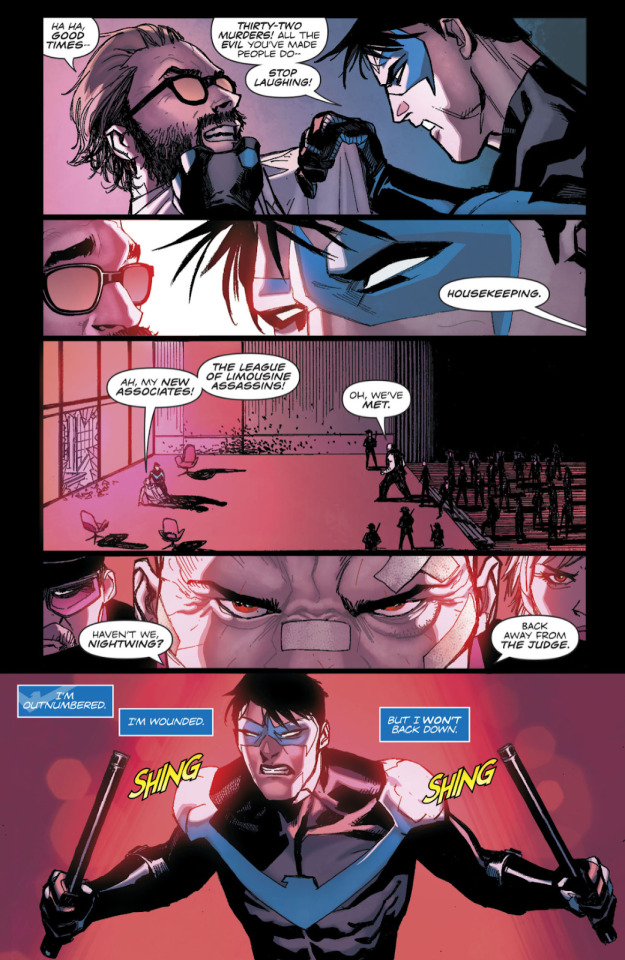
(Humphries, Sam, writer. Chang, Bernard, illustrator The Untouchable: Chapter Four: Infiltration. Nightwing: Rebirth no. 38, e-book ed. DC Comics, 2018. pp. 19)
By contrast, in Taylor’s run we never see any of that danger, and the few times we are presented with some threat, the conflict is handled with laughable ease. Blockbuster’s plots are foiled without Dick ever needing to do much of anything as he mostly relies on others to come to his aid. In this Nightwing solo series, the Titans, Batman, Robin, and Batgirl often do much of the hero-ing. Rather than putting the spotlight on Dick as a hero, Taylor lets others take the center stage, making this into an almost ensemble book. Because of this, the idea of Dick being near a breaking point, exhausted, and feeling unsafe wherever he goes is not supported by the narrative. By not giving Blockbuster a win, Taylor undermines the story he is attempting to tell.
This continues on through Nightwing #91. While Wally and Dick’s friendship were portrayed rather nicely, the villain that Taylor so ominously built up is taken down with an ease that is devoid of tension. The villain who is supposedly so good they’ve kept their existence a secret from Batman himself is quickly undermined by Taylor’s unwillingness to have his characters struggle.
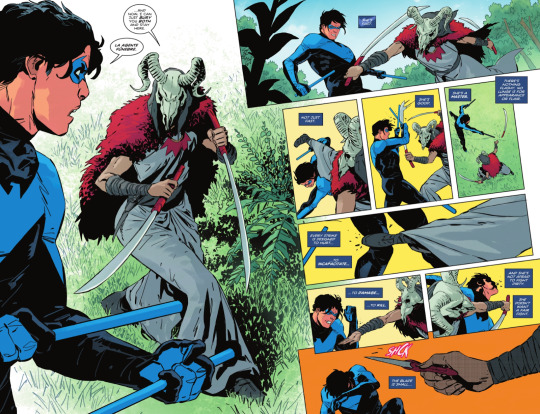
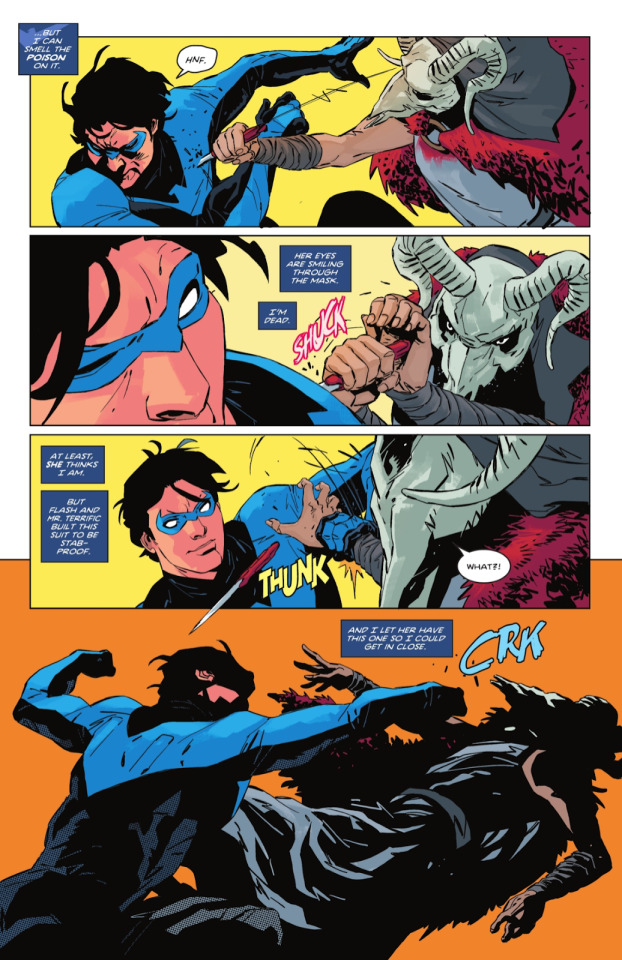
(Taylor, Tom, writer. Redondo, Bruno, illustrator. Get Grayson Act Three. Nightwing: Rebirth. 91, e-book ed. DC Comics, 2022. pp 16-17)
Besides the poor execution of his plans, however, it must be stated that Blockbuster’s plans and his motivations are poorly developed. Again, I’m not saying that Blockbuster needs to have a single sympathetic aspect to his character, but he does need to be threatening, and he must have some internal logic. Looking at the story Taylor has created, I wonder… Why does Blockbuster care that Dick Grayson created the Alfred Pennyworth Foundation? Why does he care about the creation of Haven? I understand that Blockbuster is meant to be a corrupt crime boss who wants to retain control of the city, but how does Dick building Haven interfere with his plans? Why was one billionaire throwing his money around to help homeless youths a bleep in his radar? Blockbuster already has politicians and the police force in his pocket while Bludhaven’s systems were constructed to benefit him and those who endear themselves to him. So why is he so focused on destroying Dick Grayson and not Nightwing?
I am trying to restrict my comparisons to DC Comics media, but in this, I cannot help but think of President Snow’s portrayal in the Hunger Games movie adaptations. In a movie-only scene, President Snow tells Seneca Crane about the importance of having a winner in the games. He explains how it is about letting the people have hope. As he put “A little hope is effective, a lot of hope is dangerous. A spark is fine, as long as it's contained.”
In other words, giving the people a spark of hope to keep them distracted can help prevent mass mobilization required to disrupt the system. Give them a goal to focus on, and you can redirect their attention. It would, then, be far more sinister and make far more sense from a narrative standpoint if Blockbuster allowed Dick to focus on his one project so that instead he would not turn his attention to Blockbuster. Perhaps he could have attempted to manipulate the project from within, folding it into Bludhaven’s corrupt social systems. Dick would have been that little spark that Blockbuster could have cultivated, giving the people of Bludhaven "hope" so that they would focus on that and not on what is going on behind the scenes. The narrative arc, then, would focus on Blockbuster failing to contain the spark as Dick became the flame that breathed true systematic change.
I do not want to dwell too much into fixes, as I merely wished to analyze Taylor’s run and not to go full on script-doctor and rewrite the entirety of his story. Rather, I just wished to use that as an example of how Blockbuster does not have sound plans or internal logic, and that, too, contributes to how his character comes across as incompetent and nonthreatening, and as a result, even his supposed ruthlessness is undercut.
Taylor’s Blockbuster does not have a concrete goal. He wants power and money, yes, but for what purposes? And how does he acquire said power and money? Why is he threatened by Dick Grayson’s personal project? How are his intimidation tactics challenging Dick in an interesting way? How are Blockbuster and Nightwing meant to narratively play off each other? How are Taylor’s Blockbuster tactics any different from a generic villain with any other name?
To be fair to Taylor, I do not believe Dixon managed to fully nail this part of Blockbuster’s character. I did not find Dixon’s writing of Blockbuster to be a particularly compelling part of his run. However, Dixon countered this lack of substance by leaning into what Blockbuster was meant to represent — the system inside the machine that allowed evil to flourish. Blockbuster’s influence may have been everywhere, but Blockbuster himself was hardly ever confronting Nightwing directly. Dick was fighting a war on multiple fronts, and while he could stop an enemy on his right, two more appeared on his left. The way the struggle between Blockbuster and Nightwing played out during Dixon’s run emphasized why protecting Bludhaven was so difficult — because there were so many immediate crises that needed to be dealt with on the surface, it was difficult to get to the root of the problem.
This was why, during Dixon’s run, Blockbuster could remain a threat even if he would remain unseen for long stretches of time. And this was why when Dick stopped one of the underlings, Blockbuster himself could remain an intimidating force. Blockbuster’s machinations were varied — some of his plans targeted Nightwing directly; others Dick only stumbled upon when investigating a matter he believed to be unrelated. Furthermore, the limited number of allies and the prospect that Blockbuster could only be taken down for good once his grip on other institutions of power and influence were weakened emphasized just how this was no ordinary fight, but rather a mission requiring Dick to operate on multiple fronts and strategize on a long-term basis.
Taking down Blockbuster was a multi-step process. Each of said steps offered their own challenges and opportunity for storytelling, for fleshing out Bludhaven, and for allowing Dick to grow as the protagonist of the story.
Dixon’s approach to Blockbuster requires Blockbuster to stay in the background, looming over the city as Dick fights his way forward. It’s why he remains present for all 70 issues of Dixon’s run without undermining Dick’s competence or his dedication to his city — as a stand-in for corrupt power, Blockbuster himself is not an immediate threat even if he is the powerful underlining one. Dick must constantly fight others in order to eventually be able to fight Blockbuster. To borrow video-game terminology, Blockbuster is the final boss, and Dick must first go through a myriad of levels and smaller enemies before he gets to finally take down Blockbuster for good.
It was Grayson who made the conflict between Dick and Blockbuster personal and, as a result, far more sinister. After the death of his mother in a car pile up caused by Nightwing’s activities, Blockbuster was determined to get his revenge on Nightwing. After finding out Nightwing’s civilian identity, Blockbuster came up with a chilling plan that was specifically made to destroy Dick from the inside out. Blockbuster understood that Dick did not value his own life, but rather, those of the people around him. And so, he decided that rather than killing Nightwing, he would instead kill everyone around Dick, tormenting and terrorizing him until he felt as if he were poisonous. What was so poetic about this strategy was that it mirrored what, in Blockbuster’s eyes, was Nightwing’s biggest sin: the danger he imposed on others through his actions which resulted in the death of Blockbuster’s mother.
As you can see, in this scenario, Blockbuster has become more of a proper character rather than just a stand in for corruption. That is not to say that wielding power for self-serving purposes at the expense of others isn’t a factor in his character during Grayson’s run, but rather that while Dixon’s Blockbuster was more of an embodiment of an idea, Grayson’s was more human, with more personal motivations. One approach is not inherently better than the other, they simply lean towards opposing sides of the spectrum, and that affected the type of story told and the type of confrontation Dick and Blockbuster had during their runs.
Because Grayson took a more personal approach towards Dick and Blockbuster’s dynamic, she also fleshed out their relationship to the point that it was not generic. Blockbuster’s campaign of terror against Dick was intimate, for it was something that could only have played out between these two characters. And while Dixon laid out the groundwork to build Blockbuster into a threatening figure by the time Grayson took over the title, Grayson’s strategy to have Blockbuster go after those around Dick allowed her to have Dick win and lose simultaneously.
Blockbuster starts his campaign of terror slowly. First, getting Tarantula to contribute to Dick and Babs’ breakup. While she is not the sole reason why they break apart — they are shown to have had some tension long beforehand that comes from incompatible personalities and desires — she does become a factor in their falling out. This ends up isolating Dick even further, who was already stressed due to the fact he lost his job once his boss and superior Amy discovered he was Nightwing.
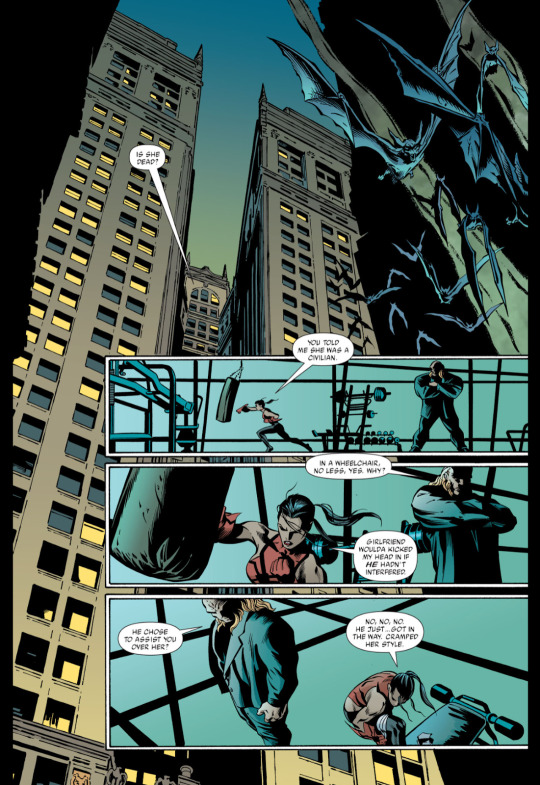
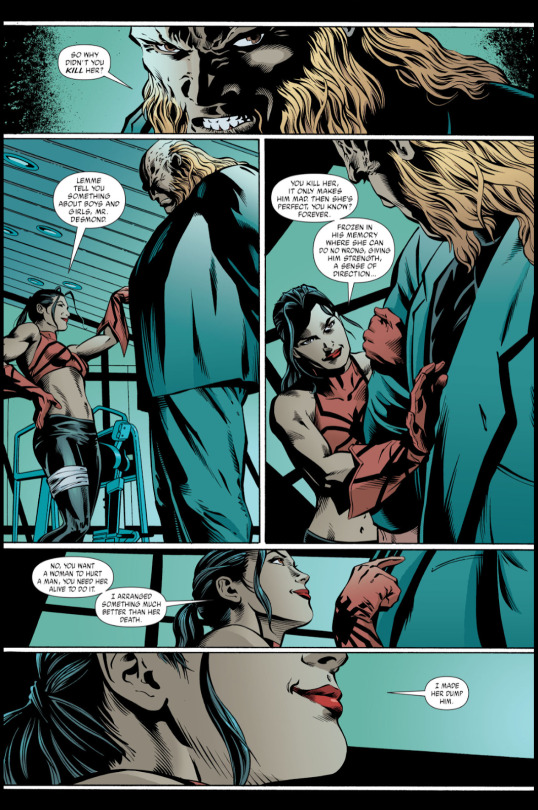
(Grayson, Devin, writer. Zircher, Patch Snowball. Nightwing. 87, e-book ed. DC Comics, 2003. pp 17 - 18)
Then, Blockbuster strikes closer to home by hiring Firefly to set fire to the circus Dick grew up in. While Dick was able to save many people who were inside the tent (and had his own life saved by Zitka), over twenty people lost their lives in this incident.
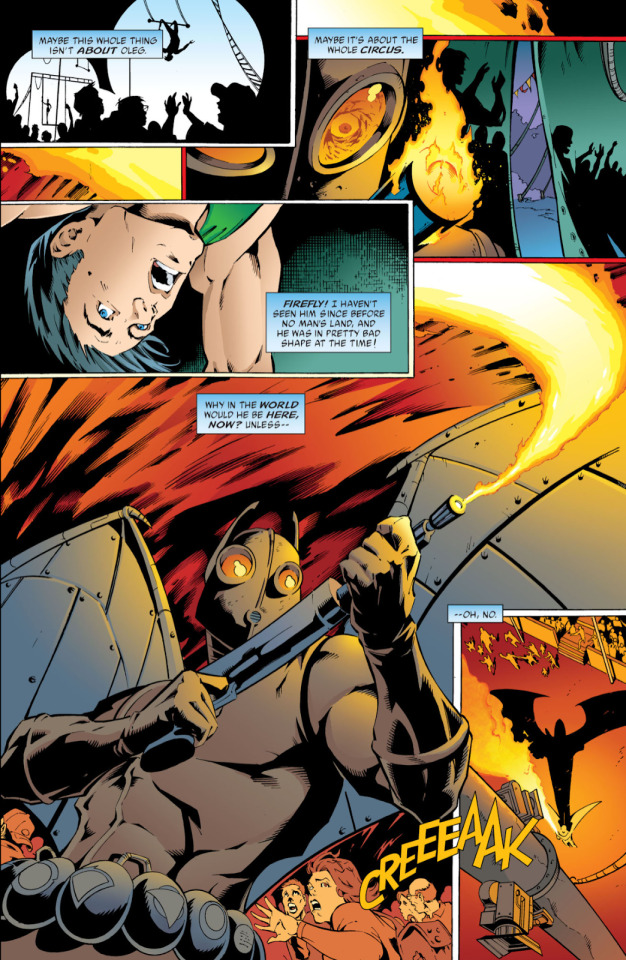
(Grayson, Devin, writer. Davis, Shane, illustrator. Flurry. Nightwing no 88, e-book ed. DC Comics, 2003. pp. 16)
While that certainly worked in breaking Dick’s spirit, it wasn’t until Dick’s building exploded that he realized this was a targeted attempt to get to him. All of those innocent people died not because Blockbuster was trying to kill Dick, but rather, because Blockbuster knew that their deaths would destroy him.
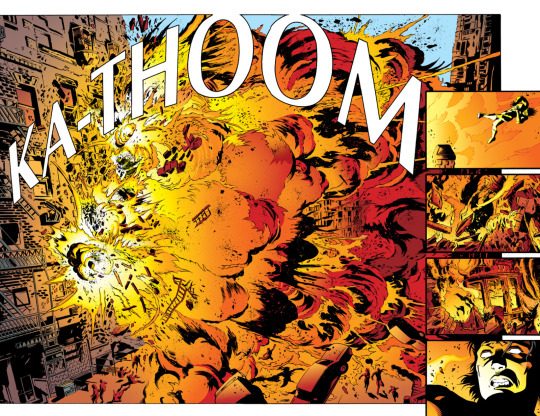
(Grayson, Devin, writer. Zircher, Patch, illustrator Avalanche. Nightwing no 89, e-book ed. DC Comics, 2004. pp. 12)
What follows is a downward spiral that demonstrates just how thoroughly Blockbuster is able to break Dick. Even as Dick gains new ground by taking out some of Blockbuster’s hired assassins, the threat still looms over him. And even when it seemed like Dick finally found a way to take down Blockbuster for good, that hope is snatched from him. The anger and helplessness Dick experiences in this moment truly speaks to the same feeling many of those who stand up against their oppressors feel whenever they are faced with setbacks in their constant battle.
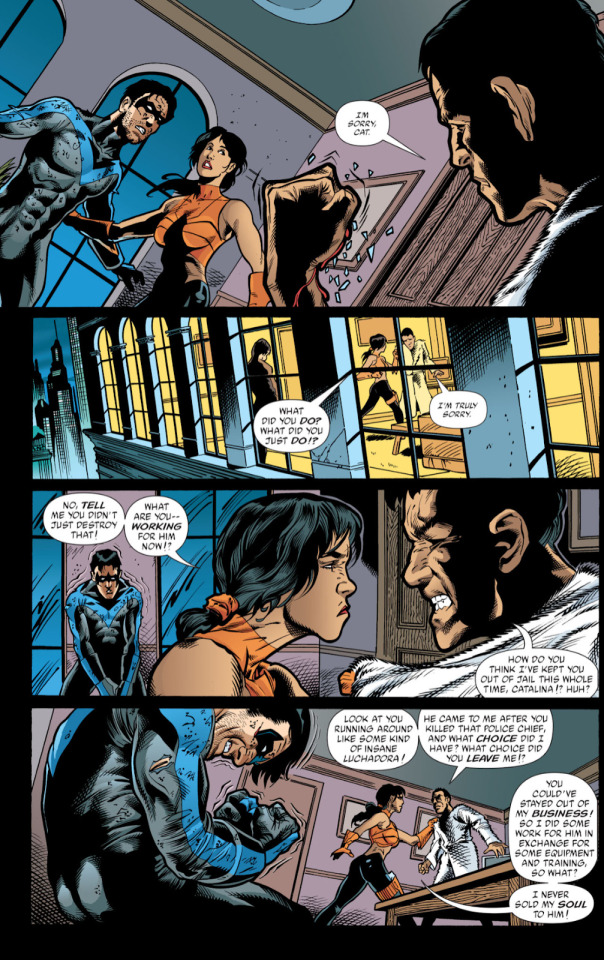
(Grayson, Devin, writer. Garcia, Manuel, illustrator Flashpoint. Nightwing no 92, e-book ed. DC Comics, 2004. pp. 21)
The carnage continues. The reporter who had uncovered Nightwing’s identity and just so happened to be standing next to Dick is mercilessly shot dead in front of Dick’s eyes.
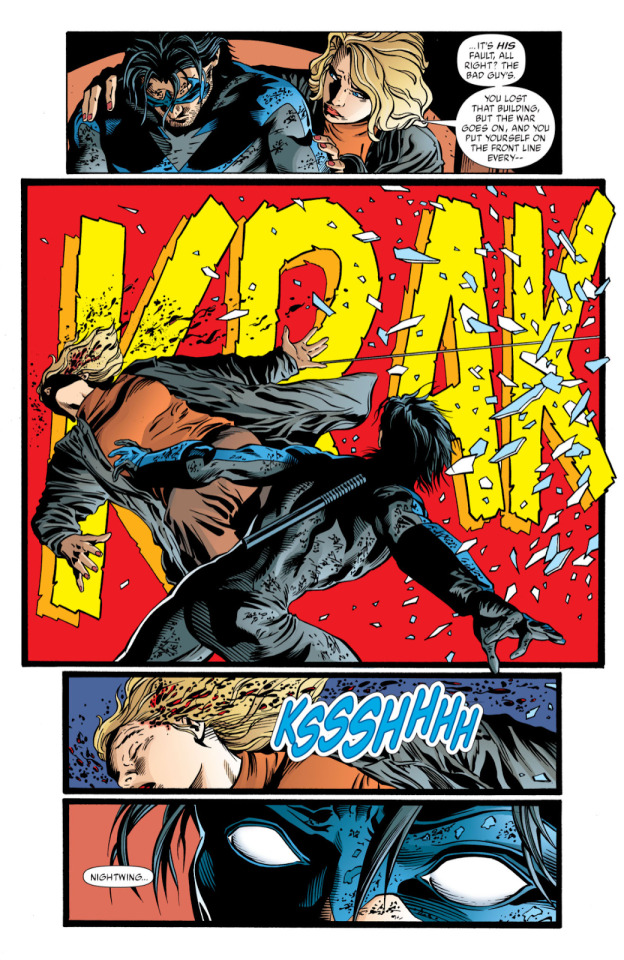
(Grayson, Devin, writer. Zircher, Patch, illustrator. Slowburn. Nightwing no 93, e-book ed. DC Comics, 2004. pp. 07)
And as Blockbuster chases Dick down, putting others in harm, we can see as Dick tries to protect innocent people around them that Blockbuster will not stop. He will not rest.
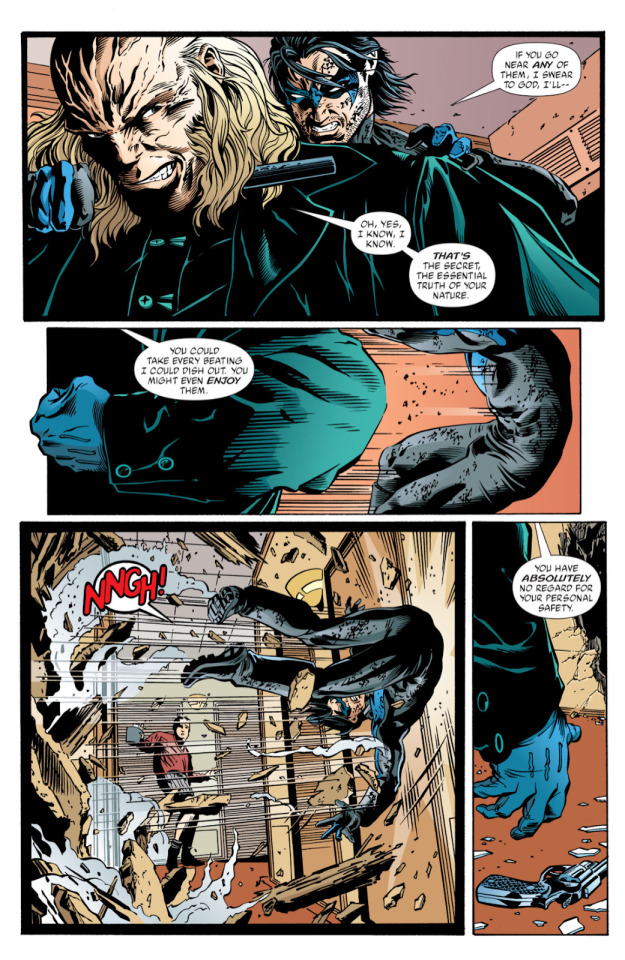
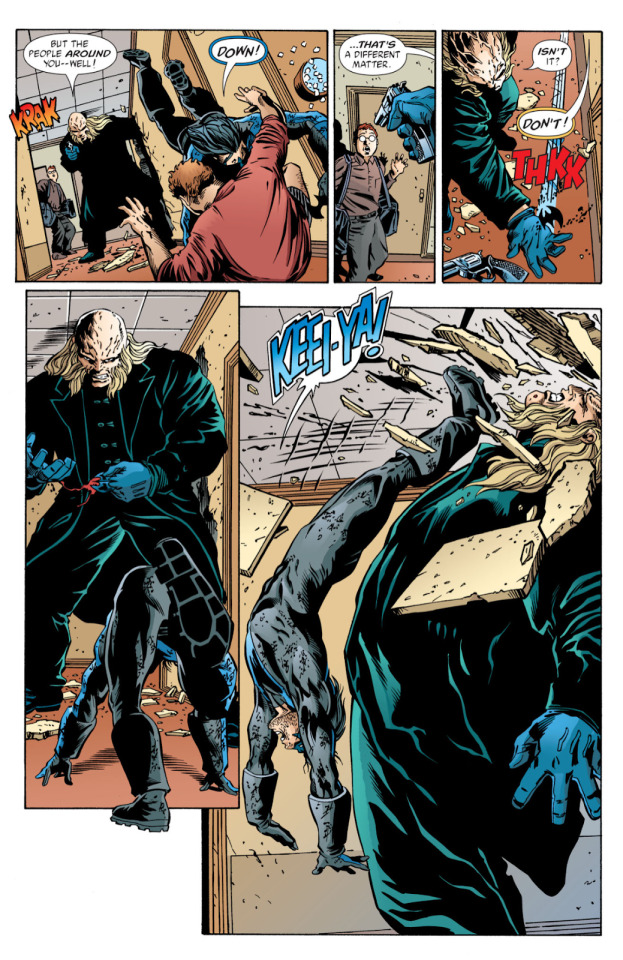
(Grayson, Devin, writer. Zircher, Patch, illustrator. Slow Burn. Nightwing no 93, e-book ed. DC Comics, 2004. pp. 10-11)
Blockbuster says it himself in a speech where he lays out exactly what his plans for Dick are. Dick is at a breaking point. The enemy, huge and impossible to overcome, towers over him. As the climax reaches its crescendo, Blockbuster asserts his power by mocking Dick and laying out a future in which Dick can never escape this hopeless terror. This city belongs to Blockbuster. Dick is powerless. There is no winning.
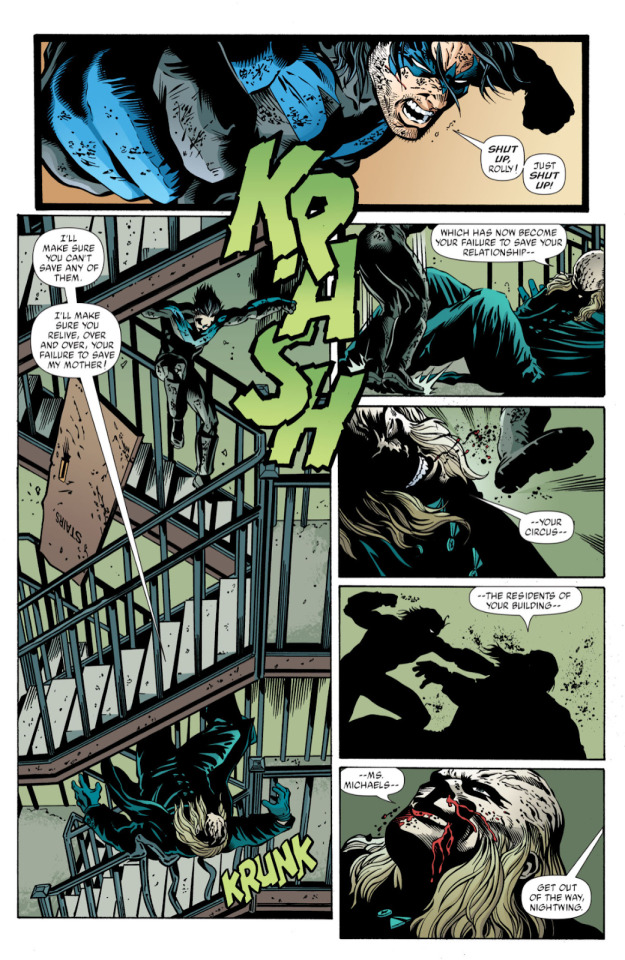
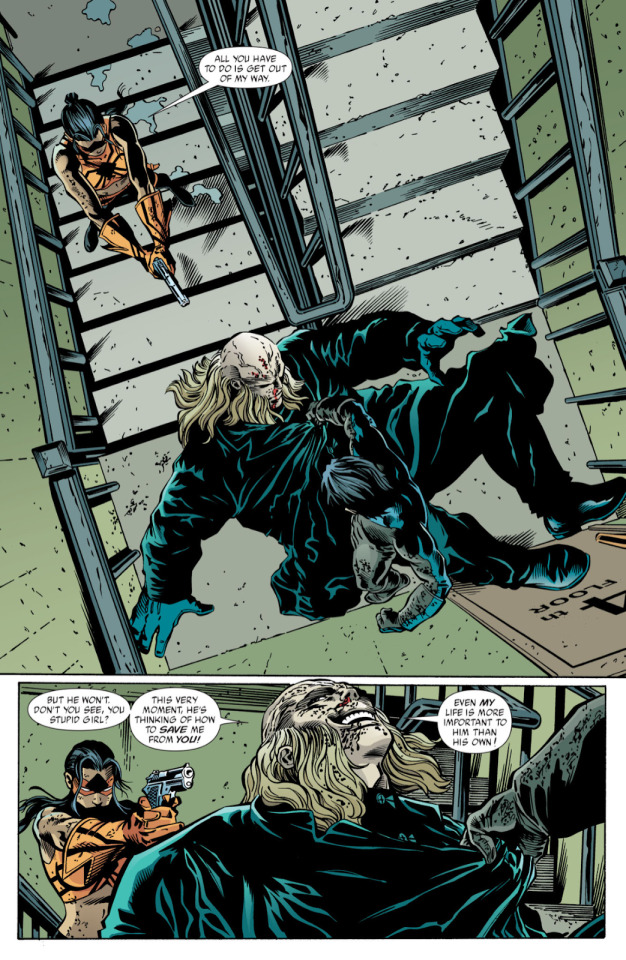
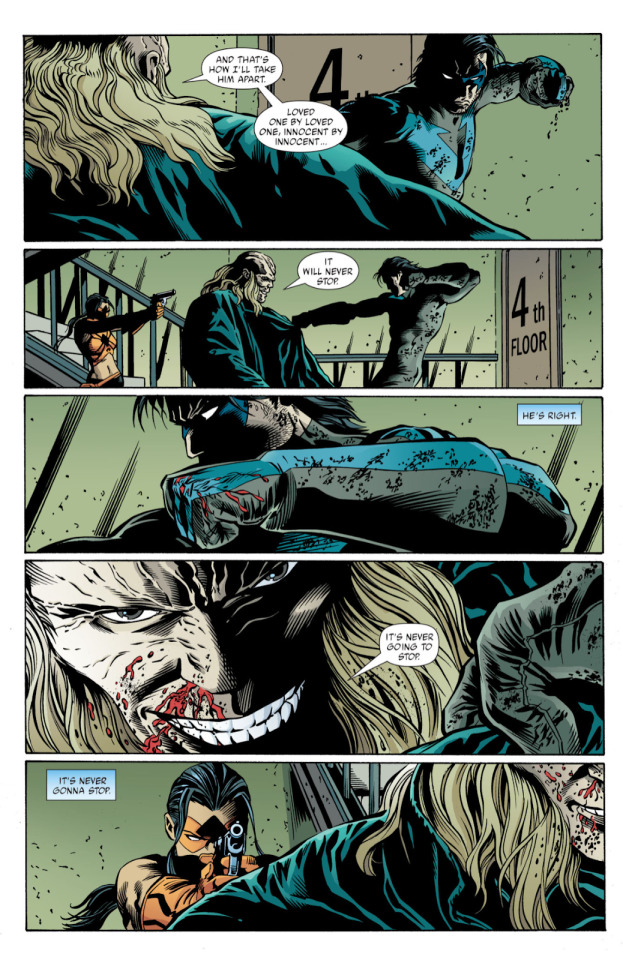
(Grayson, Devin, writer. Zircher, Patch, illustrator. Slow Burn. Nightwing no 93, e-book ed. DC Comics, 2004. pp. 13 - 15)
This speech is visceral. Personal. Evocative and filled with character and emotion. These words could not have been uttered by anyone else but Grayson’s version of Blockbuster. And they could have not been directed at anyone but Dick at this very moment. This speech has specificity that was purposefully crafted to raise the tension of this moment to its fullest potential.
By comparison, Taylor’s “I am this city” line is generic. Like much of his dialogue, it lacks character — nothing about what Blockbuster says feels distinctive to him. Nothing sets it apart from how other characters speak in Taylor’s world, and nothing about it is unique to this particular confrontation. Even the way he bangs his hands on the ground like a toddler throwing a tantrum (and resulting in Dick’s second unmasking in this run) is childish and undermines the tension of what is meant to be a climatic moment.
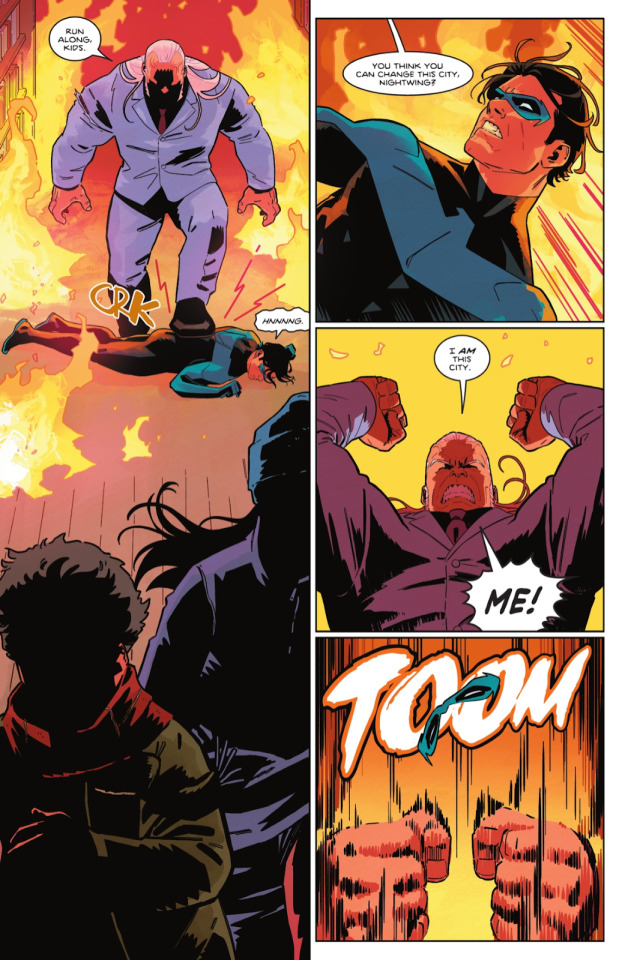
(Taylor, Tom, writer. Redondo, Bruno, illustrator. The Battle for Bludhaven’s Heart Part Four. Nightwing: Rebirth. 95, e-book ed. DC Comics, 2022. pp 20)
The themes in Grayson’s run are not the same as the themes in Taylor’s run. However, Blockbuster still invokes the threat of an oppressor. By isolating Dick from his support system, his terror and the helplessness it generates are intensified. Rather than making Dick question his own morality, he makes Dick doubt his abilities to be a hero.
While Dixon used Blockbuster’s intimidating build and power to explore the ways in which systematic corruption is responsible for the immediate evils we encounter in everyday life, Grayson used those very same characteristics to explore how one copes with being oppressed on a personal scale. Grayson’s Blockbuster pushes Dick to the darkest place he’s ever been, and the aim of her run was to see how he would be able to put himself back together again after he lost faith in his ability to make a difference.
Those two runs demonstrate how Blockbuster’s grip on power can be used to oppose Nightwing in two very different ways. Dixon’s approach requires Blockbuster to stand at a distance, the unseen machine that Dick will have to eventually destroy. This allowed Blockbuster to remain Nightwing’s main opponent for all 70 issues of Dixon’s run without ever calling into question Dick’s competence or his dedication to his mission as Blockbuster, the themes he embodied, and the struggle Dixon built clearly signaled that, no matter how great Nightwing was or how much he might wish to do so, the circumstances were not at a point where Dick could take on Blockbuster and succeed. By contrast, Grayson shifted Blockbuster from a long term, simmering threat to an immediate and personal one. This, though, also meant that the conflicts in Grayson’s run were more internal than those of Dixon’s. While Blockbuster was the enemy, the true antagonistic force that Dick would be forced to battle throughout Grayson’s run was Dick’s depression, his self-loathing, and his self-doubt. For this reason, rather than standing in the background while others did his bidding, Grayson’s run pushed Blockbuster to center stage. As he became an urgent threat who was costing people their lives every minute he roamed around free, apprehending him was no longer something Dick could afford to create a strategy around — it was something that demanded prioritization.
Nearly twenty years later, Taylor’s attempts to merge these two approaches only serves to lessen Dick’s competence and Blockbuster’s threat. Like Dixon, Taylor uses Blockbuster to represent, as it was plainly stated in his run, everything that is wrong with Bludhaven – the men in power who “have everything and still want to take more.”
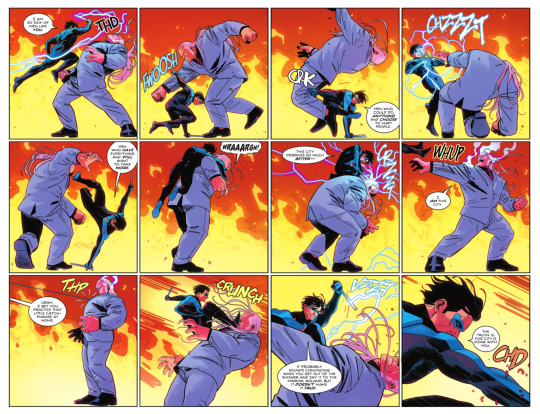
(Taylor, Tom, writer. Redondo, Bruno, illustrator. Battle for Bludhaven’s Heart Finale. Nightwing: Rebirth. 96, e-book ed. DC Comics, 2022 pp. 08)
And yet, it is Grayson’s plot beats that he copies by having Blockbuster personally target Dick in a myriad of unsuccessful ways.
While Grayson’s Blockbuster targets Haly’s Circus, Taylor’s Blockbuster targets Dick’s dog, Haly. While Grayson’s Blockbuster successfully kills Dick’s neighbors, Taylor’s Blockbuster fails to kill Dick’s neighbors thanks to Melinda and Wally’s intervention.
Because of this personal persecution, Blockbuster becomes Dick and his allies’ priority. However, because Taylor’s Blockbuster’s actions never have any negative consequences; because the humorous tone is always undermining the tension; and because the reader does not get see Dick struggle or fail against Blockbuster’s attempts the way he does in Grayson’s run, Blockbuster’s does not come across as the larger than life villain he is meant to be. Rather, his constant failures, his generic dialogue and unclear motivations, and his straightforward intimidation tactics make him more into a fumbling fool whose powerful position is incidental rather than the result of merciless oppression.
And yet, he becomes Nightwing’s priority. Thematically, Taylor’s Blockbuster is meant to imitate Dixon’s, but the narratively he acts like Grayson’s Blockbuster. This makes it so he is more of an immediate threat than Dixon’s villain, but less effective in his terror tactics than Grayson’s.
With the consequences of Blockbuster’s crimes being non-existent plot-wise, the stakes of the plot are never elevated. Blockbuster’s threat remains abstract because in Taylor’s run, everyone who is not an explicit bad guy has plot armor so thick that they cannot be forced into an uncomfortable on-screen situation for more than two or three pages at a time.
The clashing of theme and plot create enough of a dissonance as it is, but the presence of Heartless, who is actively and brutally murdering people and leaving children orphan, only deepens the problem. Heartless’ gory crimes not only overshadow Blockbuster’s failed assassination attempts, but the sheer amount of people who have fallen victim to his deeds creates an urgency and a tension that demands to be resolved.
Though Dick is aware of Heartless' existence, he does not make the serial killer his priority. When Grayson made Blockbuster’s threat more immediate and Dick became aware of the rising body count, stopping Blockbuster became his sole focus, to the detriment of his own health. Dick’s obsession with catching Blockbuster at all costs helped add to that intimidating aura around him.
Humphries understood this when crafting the dynamic between Dick and the Judge in The Untouchable. Heroes and their villains have a symbiotic relationship. When the Judge kills people in brutal ways, Dick jumps into action and stops at nothing until he catches him. This shows the audience that the Judge is a threat to be taken seriously, and it shows Dick to be a hero who will always put others first. When Dick fails to take the same approach with Heartless and instead focuses on Blockbuster, Dick comes across as an incompetent and self-centered.
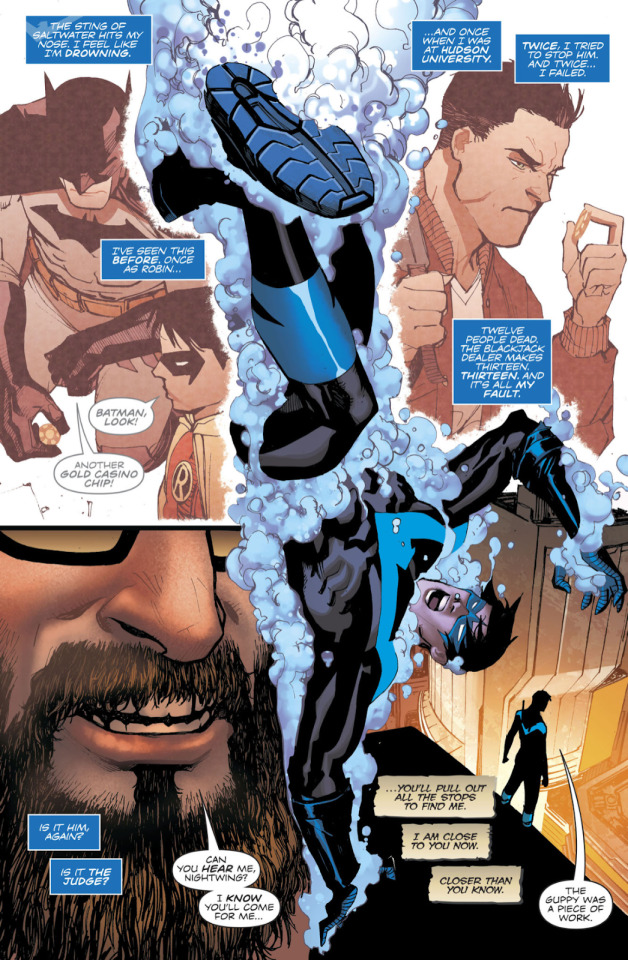
(Humphries, Sam, writer. Chang, Bernard, illustrator. The Untouchable: Chapter One: Hunter. Nightwing: Rebirth no. 35, e-book ed. DC Comics, 2018 pp. 20)
At this point, one might be wondering why high stake conflicts and ruthless villains are even needed in a Nightwing comic. I have seen many people defend Taylor’s writing by claiming that they enjoy the fact that it has no tension. They like the easiness of it, the slice-of-life nature of his storytelling. And while even his slice-of-life writing is not really my cup-of-tea, I can understand this sentiment. Taylor seems to truly enjoy writing the more sitcom-aspects of Dick and Babs’ life together. It is not the fights, the mystery, the intrigues, the nuances of living a double life that interest him — it’s the taking care of the rescue puppy, the sharing of a pizza in the park, the two childhood friends finally getting to live an idealistic millennial adult life together without having to worry about everyday problems like work, rent, family troubles, or disagreements. He thrives when writing stories that remain static, with simple episodic plots that never truly lead to character development or a change in the status-quo. He excels in quippy yet straight-forward dialogue where things don’t need to be taken seriously.
And to be clear, I don’t think that is a bad thing. I don’t think slice-of-life or sitcoms are a lesser art form than dramas or action series. Like many people, I too, have been comforted by that type of entertainment. I, too, find escape in those sorts of stories. I daydreamed about a life where I could just enjoy time with my friends without thinking about work, where the worst problem I face is how to avoid going to a party without appearing rude. Those stories have value, they have their place in our culture… But Nightwing's solo series is not that place.
Now, this will probably be the one of the most controversial things I will say in this entire essay, but despite my love for Nightwing, I do not believe that the Nightwing mantle is Dick’s ultimate true form.
In DC Secret Files: Nightwing Secret Files #1, Dixon explores the aftermath of Dick being fired as Robin by having Dick confess, with a certain amount of shame, that he always thought that he would eventually become Batman. Bruce understood that and he was preparing Dick to be his successor. Losing Robin, then, means losing any certainty Dick has for his future. Suddenly, he is adrift, not only having lost Robin, but also Batman. And that’s when Clark tells him the story of Nightwing.
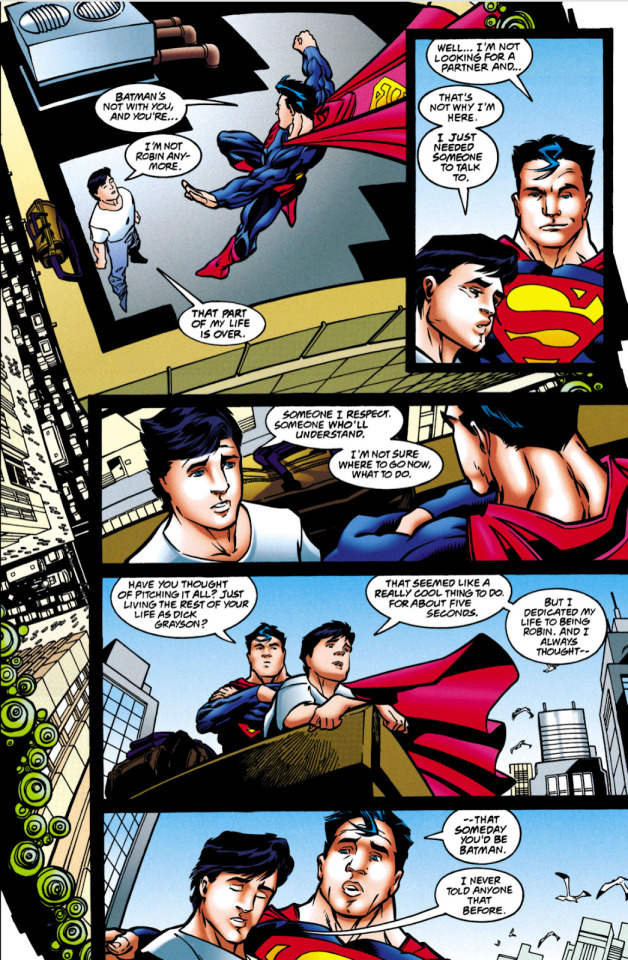
(Dixon, Chuck; Grayson, Devin; Peterson, Scott; writers. Ha, Gene; Scott, Damion; Land, Greg; Stelfreeze, Brian; Guice, Jackson; Eaglesham, Dale; Floyd, John; Jimenez, Phil; Brown, Eliot R.; McDaniel, Scott; Nolan, Graham; Rosado, William; Kuhn, Andy, illustrators. DC Secret Files: Nightwing Secret Files #1. DC Secret Files: Nightwing Secret Files #1 no. 01, e-book ed. DC Comics, 1999. pp 15)
Personally, I think there’s something really special about that idea. The Nightwing story grounded Dick during one of the most uncertain times in his life. Dick wanted Robin and Batman, but once both were taken from him, he created Nightwing as a way of coping with the trauma of having his identity, future, and certainty taken from him.
Braxi concludes his essay On Superman, Shootings, and the Reality of Superheroes by saying that “I don’t need Batman to end homelessness. I need Batman and Superman to provide moral and spiritual guidance to show us a better world is possible. I read Batman to transform trauma into will power.” (Braxi, Steve, “On Superman, Shootings, and the Reality of Superheroes” Comics Bookcase, September 2021)
The same, I believe, is true for Dick. As the character created to accompany Bruce and mirror him in as many regards as he foils him, Dick transforms trauma into power. He makes his own suffering a source of good.
As I said, I do not believe Nightwing to be Dick’s ultimate, truest form. I believe that to claim that Dick’s only happy ending is to have him be Nightwing not only diminishes the importance that Robin and Batman played in his life, but it also undermines what is so unique about Nightwing as a mantle.
Dick loves being Nightwing. Nightwing is an extension of who he is. But Nightwing is not the only happy ending Dick could have had, and to treat Nightwing as inevitable is to ignore the fact that Nightwing was born out of a trauma and a loss that could have been prevented had the circumstances that led to Dick losing Robin been different. Nightwing means transformation. He means change. Nightwing is a phoenix-like Kryptonian myth, raising himself from the ashes. But for the ashes to exist, a deadly fire must first occur. Nightwing, this great hero of light, can only be born out of pain. He can only arise from conflict.
This is one of the things that makes Dick so special. When he is overpowered, he does not give up. When he is hurt, he transforms that pain into power. No matter how many times he loses, no matter how many times he is lost, he always rises again, with a beautiful smile and an unwavering kindness that inspires others — including Superman, especially Batman — to do the same.
That is why a Nightwing story needs conflict. This is why he needs ruthless villains. That’s why a Nightwing story needs the occasional failure. Because it is only when we see Dick at his lowest that we also get to see him overcoming darkness, showing why he is the best of the best and why we love him so much.
22 notes
·
View notes
Note
so this is my first time reading Batgirl (TYSM for the guide!) and I'm pretty new to comics in general. I've made it to #41 so far, and I can't help but notice the huge decline in writing from #38 onwards with the change of writers. Maybe it's just exacerbated by how good the previous issues were; but it really feels like Cass drastically went from a rare female character that is actually written with the same respect and depth as the male characters to being turned into a "girl superhero" with boy troubles who gets forced into bikinis and love triangles. Since you seem to know a lot about what was going on behind the scenes at the time, did something happen? I know there's misogynistic/racist men in the industry who hated Cass so I was wondering if that was already brewing back then during her 2000s run
I think when it came post-Puckett era, Dylan Horrocks was faced with a choice: ape off Puckett or try something different with the character.
I'll be honest, the early Horrocks' stuff you're in hasn't aged well. The ideas are interesting, of exploring sexuality and Cass realizing she can "see" what men think of her, and I think the utter realization of Babs making a mistake is good. It's just the overall execution is more of a miss.
The thing is, #41 gives us an excellent in-character reason for her choices. It's just this is all balanced with Bruce being pretty awful to Cass during this period (because this is all in a lead-up to Horrocks "big" story for #50).
Horrocks run can best be summed as: starts "meh" has interesting ideas, but fails to fully execute them well. There are some standoff amazing moments in the comics (I think the Doll Man issue is quite underrated).
Though, you're right. This is the era when Dan DiDio began to rise to power within the DC Comics Company, and it shows during this particular run.
So during this "run" we had A LOT of things happen outside the comic.
#1 Batman: Hush going on, and that story is particularly infamous for neglecting Cass due to story writer Jeph Loeb's distaste cause she wasn't Barbara Gordon (artist Jim Lee, who now currently runs DC too had this idea but since 2020 has softened this stance and realizes the mistake made).
Add this with DiDio's bias toward the Bronze Age "iconic" characters (Barry, Hal, and Babs) you have this growing problem.
#2 Cass DID get to be involved in another comic. The Justice League: Elite maxi-series. Though she didn't show up in THE Batman story, Cass was showing up in two other series at this time. One, well is in my "infamous" Cass reading guide (Batman: City of Light), and JL: Elite.
The later series did a nice job with the "twist" that Cass was on the team and as an agent of Batman spying on them. It is an actually interesting and good story.
#3 This is the era the "editorial edicts" started to come in. So a rather infamous thing during DiDio's reign was editorial edicts that would force changes in comics (leading to some outrageous OOC moments). This happened TWICE in Horrocks' Batgirl run.
At a certain point, Horrocks is told via top brass that he's losing Babs as a supporting cast member and has to write her off the comic. So he has to write a Babs/Cass go their separate ways due to well you'll see.
The other is in regards to Stephanie Brown who'll be back in the comic past #50 (she left the series in #38). What Horrocks didn't know until a Bat summit around this time (where all the Batman book creatives discussed where to take the books in the coming months) is that Stephanie's days were numbered.
She was coming back (and as Robin), but they were killing off the character. Horrocks and Nightwing writer Devin Grayson HATED the idea and objected to it.
Sadly, they were outvoted and well whatever else occurred in those meetings (or after) resulted in Horrocks quitting the Batgirl series and DC Comics itself by #57 (this is why Horrocks' run on the book just ends abruptly with no real end). Horrocks is still currently just enjoying the life of writing and doing Indie comics.
Interestingly, whatever Horrocks said or did it's interesting to note his is the only run never collected fully by DC Comics. Sadly, the only Batgirl issues that were EVER put in a trade were the stuff that made him walk (Batman: War Games, the event that killed Stephanie Brown). That was until the mid-2010s when DC released a HC Batgirl Anniversary trade that also included stories of Bette Kane, Steph, and Cass as Batgirl. #45 (aka Cass wearing Babs' Batgirl costume) is in the trade collection.
Ironically, this bad management editorial would also eventually affect Kelley Puckett (who returns to DC with Supergirl Vol. 5 #23-29, 31-32) around 2008 to 2009 but then ALSO decided to leave DC and comics altogether.
Not those two, but also the writer who'd replaced Horrocks, Andersen Gabrych (who was one of the minds behind War Games). However, I honestly do love Gabrych's run on Batgirl more than Horrocks. It's just the edicts and the rushing toward the end of his run kind of sours it.
I hope all this information is helpful.
33 notes
·
View notes
Text
Yes skulls are a big no no in Navajo culture. But really so are tattoos in general. There is zero tattoo historical practices for the nation. Some even see tattoos in general as dishonorable as you are marking/destroying your body. Similar to how hair is sacred for many inking the body is like cutting off a person’s braids. Not all believe this but some do. Roy’s original tattoos have no true cultural significance. Devin Grayson either made them up entirely based off stereotypes or confused another cultures practice and mistakenly applied them to Roy. The idea that they are ceremonially or culturally significant is 100% fake. In fact the new 52 tattoos are actually more culturally accurate as later stories wrote they were purposefully made to be wrong and off putting to Roy and try and signify that something was wrong.
23 notes
·
View notes
Text
okay, let me just-
the apprentice arc from Teen Titans (2003) and the Renegade arc (Nightwing 1996 #112-#117) are different.
I have not seen the show and I need to re-read Renegade but this is more a general overview rather than a deep dive.
the version of events where Dick is forced to be Slade's apprentice because of the nanobots or whatever is from the show. he is never called Renegade (to my knowledge) during this arc. not that you can't call him that if you want to. but this is not where the name comes from.
Dick is not forced to be Renegade in the comics. you can, of course, have a plot line where he is in your fics or whatever for flavor, but in canon Dick is the one that becomes Renegade to secretly try and take down a group of villains.
in post-crisis canon this is also where he trains Rose.
(in the current canon he trains Rose when he's fired as Robin iirc? it's weird.)
the Renegade arc is directly why Blüdhaven got nuked. Slade was pissed that Dick had tried to turn his daughter against him and suggested that the nuke be dropped on Blüd, (because the group of villains was going to drop a nuke regardless for reasons,) to get revenge.
I am not talking about the quality of either of these stories nor am I trying to spark that discussion. this is simply to provide information that I am seeing is very lost.
I recommend just reading through the arc if you want to write something about Renegade as he is in the comics. I know reading a shit ton of comics can be overwhelming but the arc is like 6 issues. you can easily find it online and it won't take you long at all.
I will not lie, yes you will miss context of the shit happening around Dick at this time, the Crutches storyline is important to understanding his mindset at the time, but you don't need to read it to understand Renegade enough. (Dick does a pretty good job explaining his mental state in #112 himself too.)
there are a lot of events happening at once in this time-frame, UTRH and also Infinite Crisis, so it will be confusing in some aspects just because of that, but still. you'll understand it enough. (and hey, UTRH and Infinite Crisis should probably be on your reading list anyways. UTRH more so than IC but still.)
you don't have to be comic accurate when you write Renegade, I'm not making this post to say that fanon versions of Renegade are wrong and bad. I am simply trying to provide information and guide people in the right place if they do want to know the source material.
I will repeat again that this is not about the story quality of either arc and DO NOT start a conversation around Devin Grayson on or around this post. that is not what this is about and you know it.
finally for some visual aids.
apprentice arc:
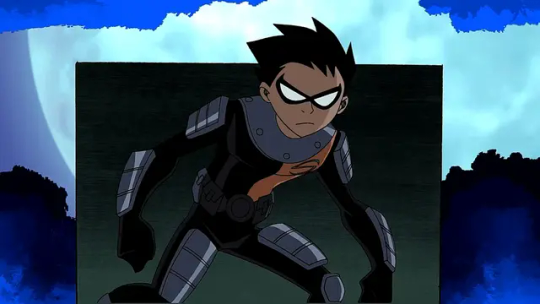
Renegade:

#ngl I do not love how the Renegade suit looks#I think it could be improved though pretty easily#also Dick and Slade's relationship in general is very different between the comics and the shows#not what this post is about but like#they are not the same#the obsession is much more one-sided in the comics#dick grayson#nightwing#richard grayson#teen titans 2003#nightwing renegade#apprentice arc
10 notes
·
View notes
Text
vote in my poll boy but also im gonna skew my own results by giving my opinion. here’s my personal ranking of rose writers
sean mckeever: FRESH HELL <3 literally THE rose book. also tt03 #57 slayed. he ALMOST gets knocked down on the list because a) the fucking shitshow that was terror titans and b) he backtracked on like 3 different character arcs as soon as he started writing tt and it pisses me off. but he redeemed himself with fresh hell
geoff johns: i hate johns so much. but he solidified sooo much about rose as a character that he has pretty much the definitive rose. what he did completely defined rose's relationship with her father and her attitude towards the titans/being a hero in general. whether they realize it or not, every rose writer after johns is writing his version of her. as much as i hate him he is one of the best rose writers and i will stand by that
christopher priest: i have not made it a secret that i love ds16. there are some aspects of his characterization that i dont agree with but for the most part he killed it tbh. hating her dad but still coming back to him, loving her brother but still keeping him at arms length, HOSUN!!! HER HMONG FAMILY!!!!!!! ily priest
ed brisson: SLAY. the only reason he's not higher is because i dont like the fact in general that she chose to be on stormwatch (she would not do that), and he used baby rose in ktr and didnt even mention lili (and DID mention that foster family. im still mad). other than that!!! everything about her struggle to be a good person in batb was soooo good, and so much about ktr was so good for her <3 thank u mr brisson
marv wolfman: i feel a little bad not ranking him higher given that. he created rose. but she doesnt really do much in the issues he writes. which is fair given that she was a new character that was just made to hang around on the sidelines at the time, so theres not a lot to judge in his writing. but he definitely laid the foundation that johns expanded on, and he was the one that made her so uh thnx marv
jt krul: i wish he had gotten more time :( i wish he had gotten to do whatever he was planning with lili, i wish we could've gotten to see more of his rose. his rose was def a different take than before given that she was more... mellowed out ig? it was a lot more lighthearted, just her hanging out with the team, being an older sister to damian (<3), and looking for her mom. hes not my fav just because i like it when shes a crazy bitch instead of a normal girl, but i completely understand why people like his rose. not to mention tt03 #77-78 slays so unbelievably hard
jay faerber: NANNY ROSE <33333 i love love love rose in titans 99 <3 this version of rose is DRASTICALLY different than any other rose, which is the reason hes in the bottom half, but i like it in the sense that its nice to know that she was just hanging out in between the two worst things to ever happen to her (her mom dying & slade drugging her). rose with roy and lian lives rent free in my head every single day of my life i love it so much, also that issue with rose & toni was so fun. titans 99 rose you will always be famous
adam beechen: he is going to hell for what he did to cass but for rose? he was fine. he helped with that one really good wilson family arc (tt03 #43-46), and wrote the only pre-52 rose & jason interaction (#47) so he gets points for that. and batgirl 2008 was pretty good for rose. but unfortunately he just didnt make enough of an impact on me to be ranked any higher
matthew rosenberg: unfortunately im mentally ill so i have a detailed explanation of what i think of rosenberg's rose but the short version is: i like him, he writes a good rose. its fun, shes well-written for the most part, but there are some :/ parts about it to me. i think if he continues writing her he'd be ranked higher but for now hes sitting pretty near the bottom of the list
devin grayson: i used to really like devin grayson's rose but. i have since changed my mind. it doesnt feel like rose. this is NOT the rose that stabbed her eye out because she thought slade was disappointed in her! shes too Quirky Girl here even though this is theoretically during the period where shes being drugged (honestly. i dont think grayson actually knew about the super soldier serum. and if she did it does not show) and we've seen rose in this era in tt03 and bg00, and this arc does not read as the same character at all. it was a good arc for her, and she had a lot of good moments here! but the characterization overall wasnt great
joshua williamson: i won't go on a whole tangent about the way williamson writes but. he has no sense of character voice, his characters all feel like blank slates to get the plot across, there are no character decisions being made besides what's needed for the plot. theres not a lot that i can put my finger on and say that its bad, but there are so few choices being made that its hard to say anything about his rose. to put a completely different character in rose's place in robin 2021, all you'd have to do is switch a few words around. williamson uses a vague idea of who a character is to guide what he wants them to do, and all his characters come out shallow. his rose wasnt BAD but it wasnt good at all
scott lobdell: every day i blow on a dandelion and wish for scott lobdell to kill himself
#re: williamson. for some reason the 'he cant write character voice' rule does not apply to ollie#like everyone else in ga23 is very eh. but hes nailed ollie's voice#the plot sucks. the pacing sucks. the decisions usually suck. but he can write ollie in a way that he cant write anyone else#trying so hard not to go on an entire rant about how williamson writes characters. i swear im trying to stay on topic#rose wilson
27 notes
·
View notes
Text
I’m going to hold your hand when I say this but some of you need to realize that if Devin Grayson used racist stereotypes in Nightwing 1996 writing Dick and Yoska then she was also using racist stereotypes writing Catalina Flores
the concept of an aggressive, sexually predatory Latina is not new, it’s not original, and frankly it’s tiring to see be repeated
acting like the way Catalina was/is portrayed in canon/fanworks is totally divorced from her ethnicity is how we get fics where Dick is triggered by hearing someone speak spanish (not even the specific pet names that Cat used, just spanish in general??!)
and I like Catalina as an antagonist, at least a secondary one, I think the Blockbuster arc has held up well compared to some other runs, I think that Devin is a decent writer with pretty good pacing for comic books which I can appreciate, and shockingly, I’m fine with the rape taking place in canon and the aftermath, as I know that the run was cut short (I’m a dead-dove fan and I’ve always liked any kind of whump, I can see why others don’t though and I understand that)
I also think that fanwriters need to be aware of bigoted source material, and that they don’t need to exacerbate these problems by flattening Catalina into a hypersexual, “crazy Latina” caricature which Devin even didn’t fully do in her run
I promise guys, there is a way to write her that doesn’t lean into stereotypes but still has her doing a terrible thing, I pinky swear
#nightwing 96#catalina flores#devin grayson#I am genuinely glad that people are quick to point out the anti-roma stereotypes used#but people are very quick to accept that Catalina is just like that- no influence from racism she’s just an evil bitch#i still can’t get over how someone wrote dick being literally triggered by someone speaking spanish around him#like he didn’t live in new york. like gotham and bludhaven aren’t large multicultural cities…#I have tips for rewrites if anyone needs them#pleading and begging#this is part of an ongoing trend of people treating female antagonist like static events that happened instead of people making a choice
9 notes
·
View notes
Note
random question but what do you imagine Garth's childhood (pre-Aquaman) like? Like Aquaman we saw raised by Dolphins and then he briefly had his lighthouse keeper dad. Garth we saw abandonded as a kid but we never (from what i've read so far) got to fill in the details
SO, going based on Devin Grayson's book (which is overall bad, imo, and not just because it's Devin...) he doesn't actually remember much of his pre-Arthur childhood. This is implied to be because Atlan was pulling some strings and imo that means Garth might not have been really interacting with much of the world. Which isn't really great for a child's development...
I think the best answer is: lonely and terrifying. It's likely that Arthur was the first humanoid he met (and one he could communicate with! What luck!) so before that it was probably a lot of: avoiding being eaten and try to find food for yourself. It's no wonder Garth is resourceful and overly-attached to people who show him kindness.
Silver Age, where he is exiled as a young child and not a baby, it was probably just very sad; he know his parents died and he was so undesirable that they sent him the surface, something they only did for babies! And Garth was FULLY prepared to never go back, so even then it must have been incredibly lonely.
You did not ask, but if DC wanted to avoid the implications of a totally feral child (which Garth would be, in a realistic world) I think having him live on the fringes of society would be a good compromise for any future versions of him; think Oliver Twist or similar street urchins in fiction with no parents and no support systems, who still can somewhat operate with the general public.
18 notes
·
View notes
Text
this is just stream of consciousness wrt to an ask i got
i don’t read much dc fic but a primary point of avoidance for me is the fallout of nightwing #93 because to address the situation with nuance u would have to disentangle devin grayson’s particular brand of sexualised racism (both by rewriting tarantula to be latina and her interpretation of rromani characters generally) and understand the context for dick grayson’s character prior to that point, and how it’s affected modern interpretation for his character.
i say this as someone who is attempting to include this in a fic, because it is hard to emphasise exactly how damaging it’s been for his character long term. part of it is fundamentally misunderstanding what constitutes assault on the part of the comic writers, sure, but i would also encourage people to just…. consider the context. why are u writing other people enacting revenge on tarantula on a survivor’s behalf? why are u uncritically engaging with devin grayson’s racism? why are u writing characters violently slut-shaming a survivor of assault when they would never ever react that way (roy harper, donna troy)?
and why is jason todd always there, for some reason
#assault tw#dick grayson#dc comics#batfam#nightwing#i can delete this if it’s too mean but fr#tbd#spokes
200 notes
·
View notes
Note
I was thinking about this and you seemed like the best person to ask: in '96 Nightwing Dick claiming responsibility for Catalina doesn't make sense? The Bats do believe in rehabilitation and do take responsibility for things that are outside their control. So. Yeah. Dick blaming himself for Blockbuster's death makes sense (makes sense as in is in character) and him blaming himself for not being able set Catalina straight kinda sorta makes sense? Because the Bats rehabilitate? But saying he failed her per se doesn't make sense? The way he takes responsibility for her, you'd think she was a kid not a grown woman and that somehow Dick's the adult responsible for her. There doesn't seem to be any reason, any incentive for that. But he was weirdly invested in her🤷♀️
To clarify, this is the conversation that we're gonna be talking about:

(Nightwing Vol 1 #117, aka the very last scene of the Blockbuster arc)
And I think there are really three levels on which you can talk about this.
First, is it in character for Dick to take responsibility for Catalina? I think, as you say, the answer to that is pretty unquestionably yes. Dick takes responsibility for everything. He feels responsible for Bruce's instability, for Jason's death, for his parents' deaths. He feels, rightly, a massive responsibility as a leader of the Titans and the Outsiders, and as a leader within the superhero community generally. He takes responsibility for things that are clearly his fault, and for things that have absolutely nothing to do with him. The central tenet of Dick Grayson's character, from which all else stems, present implicitly and explicitly pretty much since he stepped onto the page, is that he is constantly aware of the crushing responsibility of the life he's chosen, and constantly afraid of failing.
Second, is Dick actually responsible for Catalina? And the answer there is no. He has no formal relationship with her; he barely has an informal relationship with her. He never mentors her, he never dates her, he never encourages her. In fact, he actively warns her that she should not be a vigilante. By the time that Catalina kills Blockbuster, she's already committed one murder, for which Dick had her arrested.
When Dick says here that he abdicated his responsibility to Catalina, what he means (I think) is that he allowed her to kill Blockbuster. And while that was an abdication of his responsibility, it wasn't a responsibility to Catalina—it was a responsibility to himself, his profession, and to the world more broadly. (And, in Dick's mind, to Bruce, but that's another place where Dick and I disagree.) Catalina arrived on the scene with the intention of killing Blockbuster, having already committed murder in the past, fully aware of her actions and motivations. She is an independent moral agent, and Dick is not responsible for what she does—only for how he responds.
Third, and most complex: Does the story here make sense? Is it thematically coherent? Is this a satisfying and appropriate ending?
And I... don't know.
The thing is, if you set aside Death of the Author, it's pretty clear what story Devin Grayson wanted to tell with Dick and Catalina. She's spoken on it extensively in interviews:
[Dick] would make a terrible boyfriend, which is actually part of what his relationship with Tarantula explored—he was involved with Babs while that was going on and would have declared with utter sincerity that he loved Barbara at any point in that debacle (and yes, that relationship was deliberately a debacle). Worse, he would have meant it. One of the (obviously too many) issues I was trying to look at there was the tension between Dick’s laser focus—wherever he is and whatever he’s doing, he’s 100% on it, which is part of what makes him so effective—and his romantic restlessness. Most of the people in his life are very protective over him and, in their own ways, very accommodating of his inexorable energy level. They understand that he comes and goes and that when you have him with you, he’ll do absolutely anything for you to the full extent that he is capable of doing it (which will often be superheroic), but that he will eventually be compelled to go help someone else. So if you have someone who has to save everybody, and has to bring his full focus to bear on everything he does and every interaction he has, and if he’s inherently loyal but also relentlessly energetic and itinerant by nature—what happens when he finds himself trying to help someone who does not share his morals, does not have his best interest at heart and is not above physical manipulation? That’s Catalina.
(https://thebatmanuniverse.net/tbu-exclusive-3/)
Setting aside some of the revisionist romantic history and coded racist language there, Grayson sees Catalina's role in the story as seductive. Not (necessarily) in the sexual sense, but in the sense that she captures Dick's attention and draws him into worse behavior than he would otherwise display. In this understanding of the story, Dick is an active participant in a toxic relationship: Catalina pursues him, and he, with the best of intentions, reciprocates, and it spirals into destruction.
If that's the narrative, then Dick taking responsibility for Catalina at the end of the story makes a certain amount of sense. He's still not responsible for her actions directly, but he played into, even encouraged, a toxic dynamic and then, at its nadir, made a decision that ended in a man's death. I might not phrase that as "abdicating his responsibility to Catalina," but I can understand where that idea would be coming from.
The problem is, that narrative simply does not exist on the page. Maybe it's what Grayson intended to write, but it's not what she actually wrote. Dick is not infatuated with Catalina. He does not encourage her. He honestly doesn't even really try to help her. Most of the time, even before things turn sour, he seems vaguely irritated with her. For one issue, before he knows anything about who she is or what her morals are, he entertains the idea that it might be cool to mentor another hero—but he doesn't do that, and again, he very quickly has her arrested for murder. He is, in fact, throughout the entire arc, deeply in love with Babs, to the point where his inability to let go of their past together is the thing that actually destroys their relationship.
And so we're left with an arc where most of Dick's actions make sense, where I do believe that he's acting in-character the entire time... but in this, the final scene of the story, he takes responsibility for something that really isn't his responsibility, and the narrative doesn't challenge him on it. This isn't just a thing Dick says; this is what Dick says as the final note that the story ends on. This is the takeaway. And unfortunately, it's a takeaway to a story that just doesn't actually exist on the page.
99 notes
·
View notes